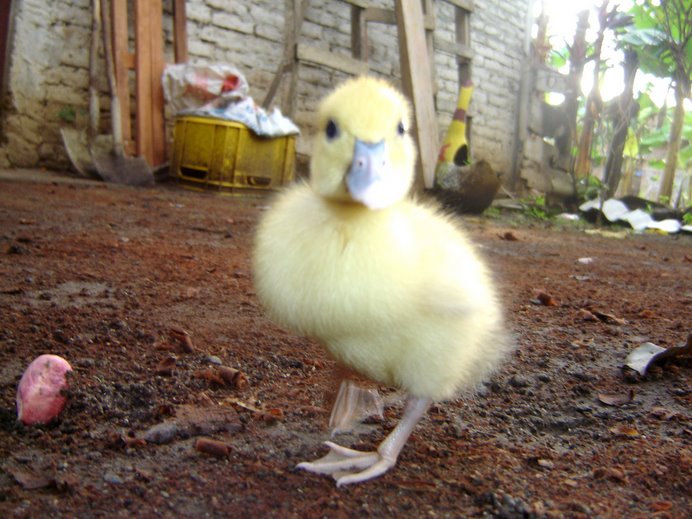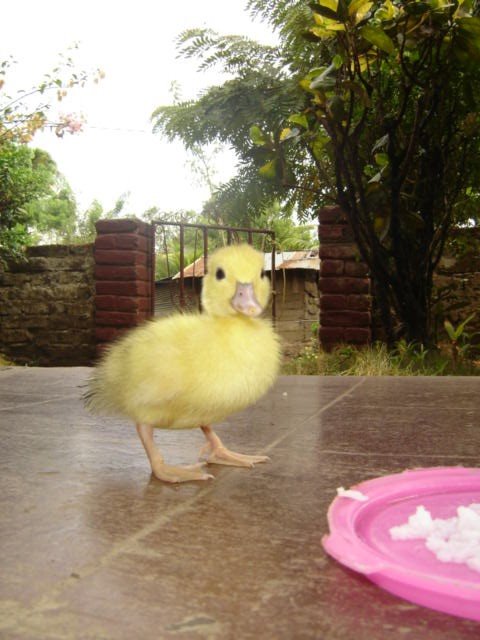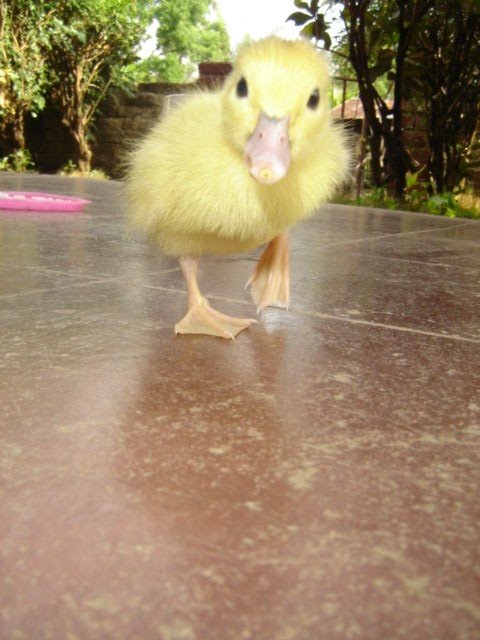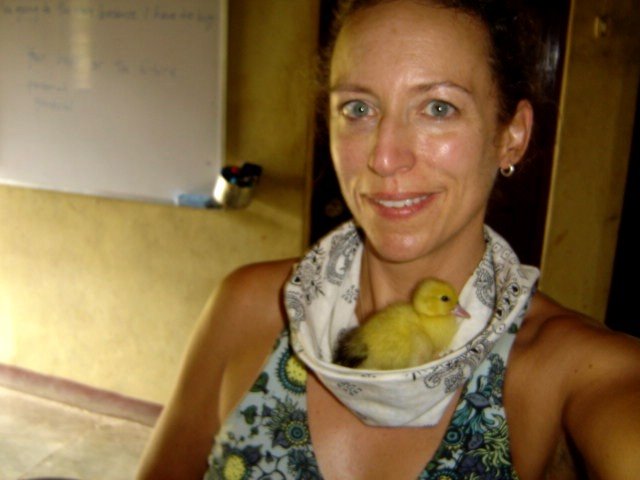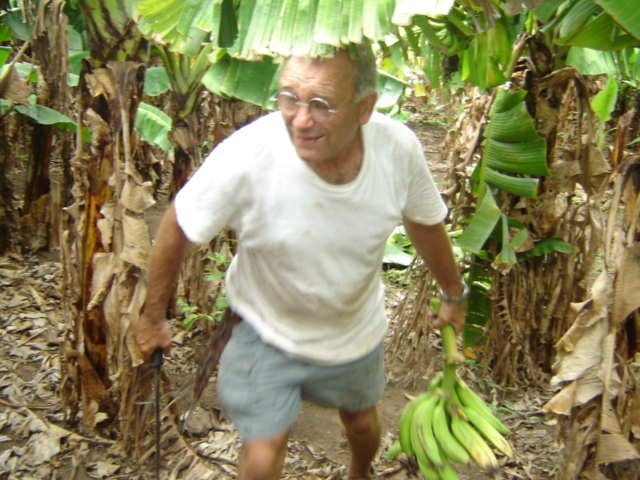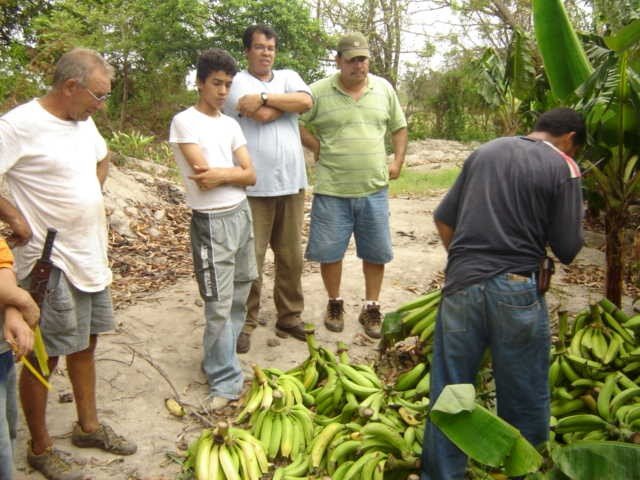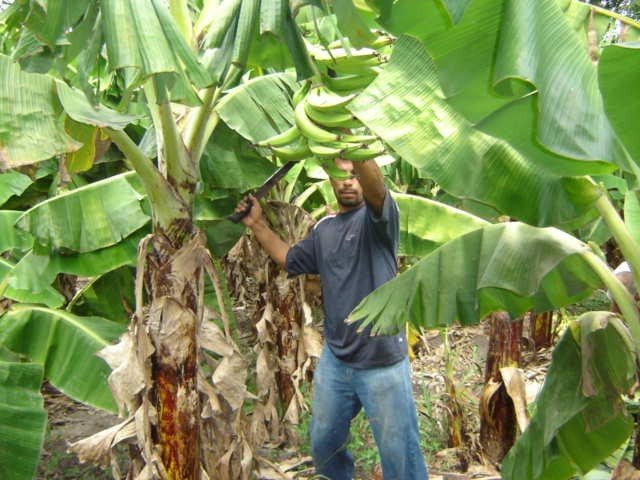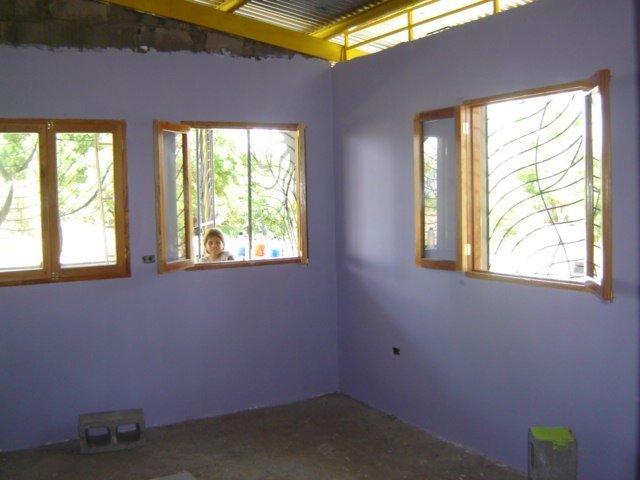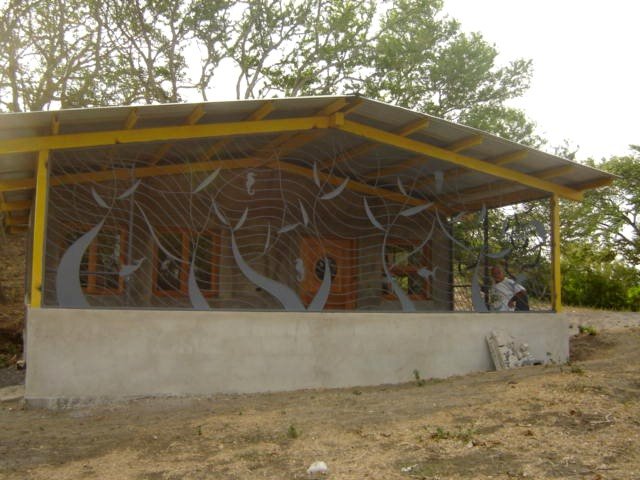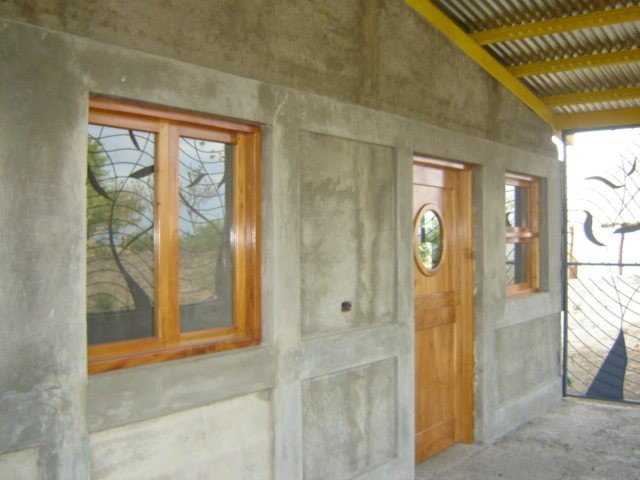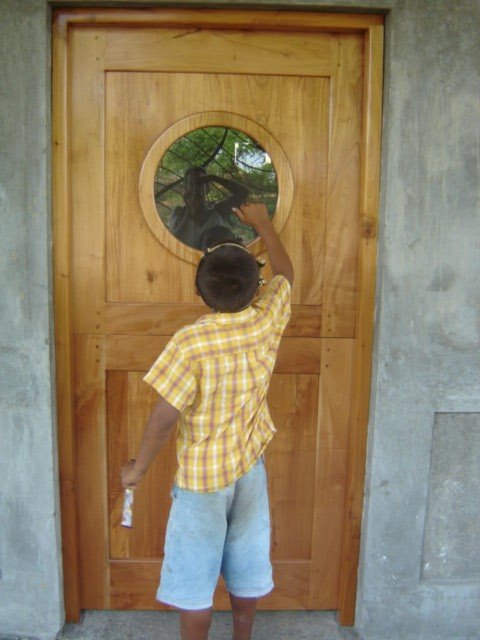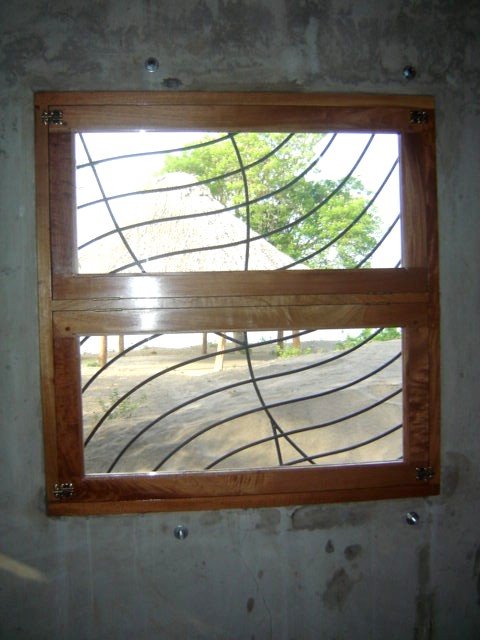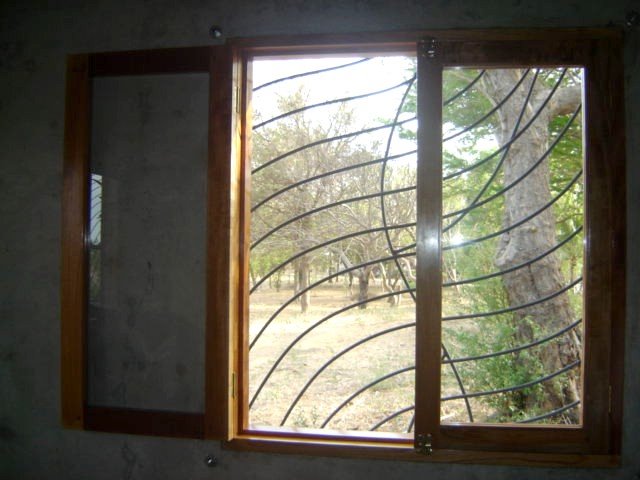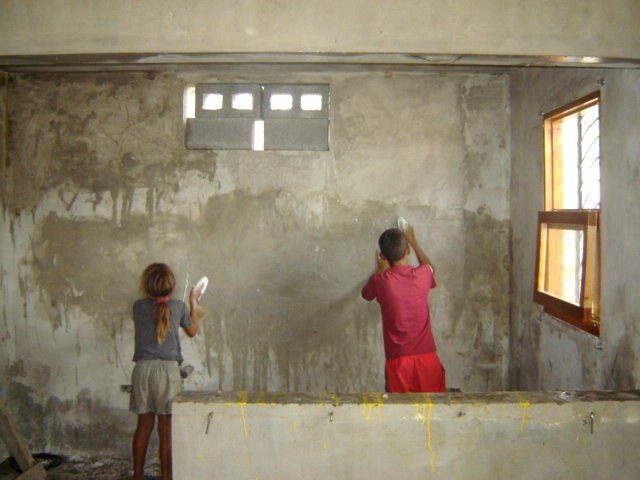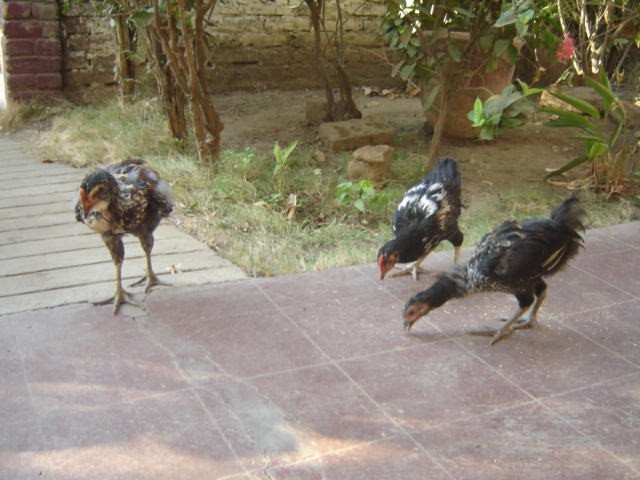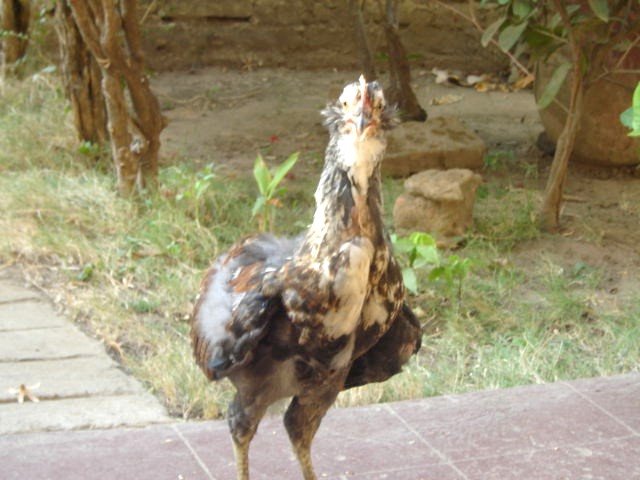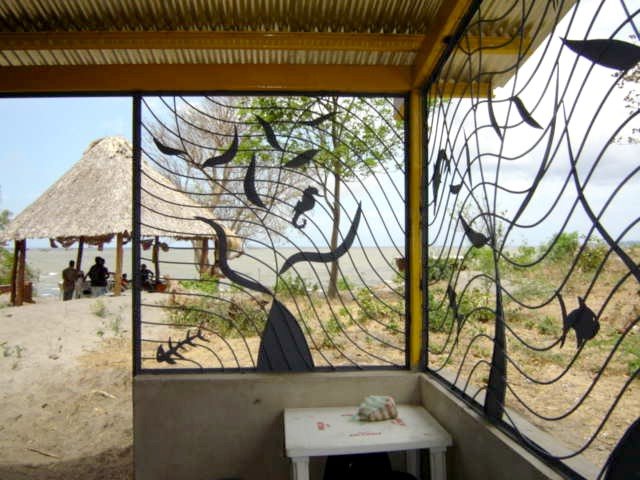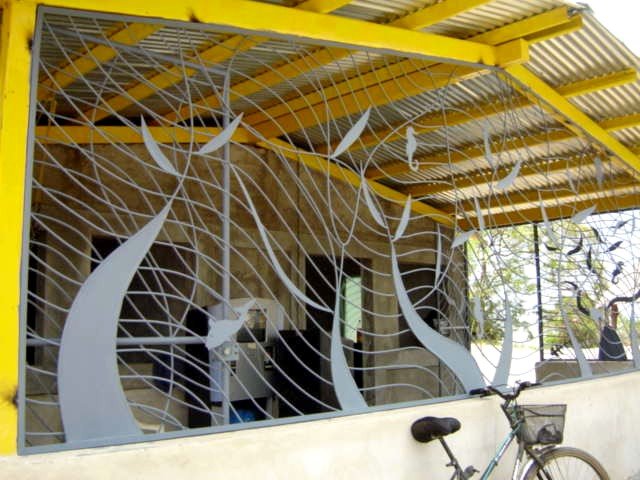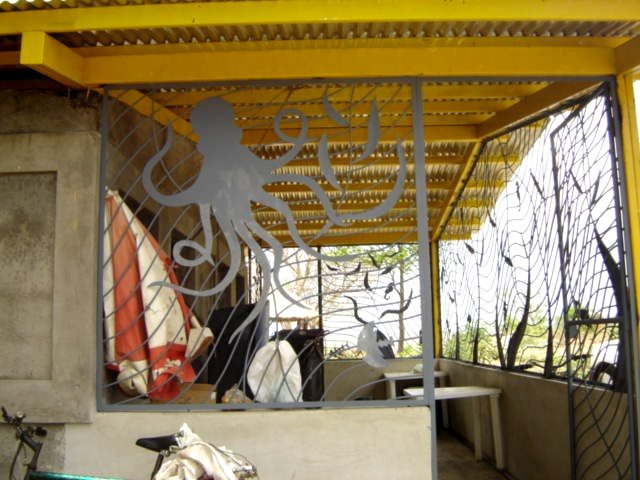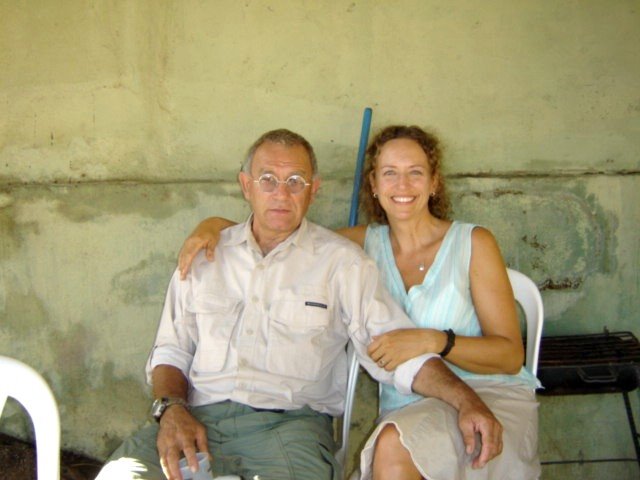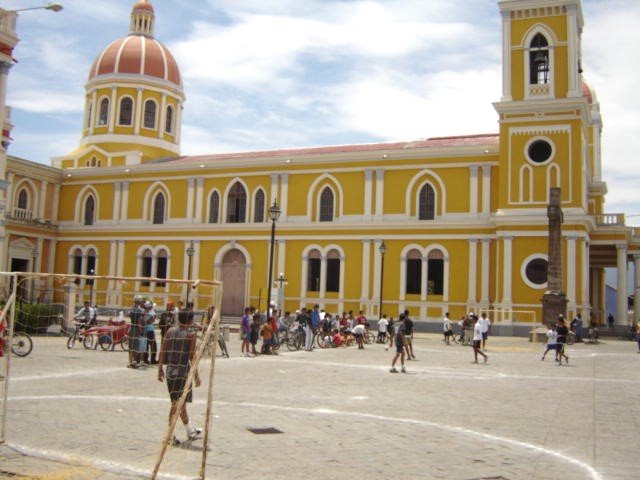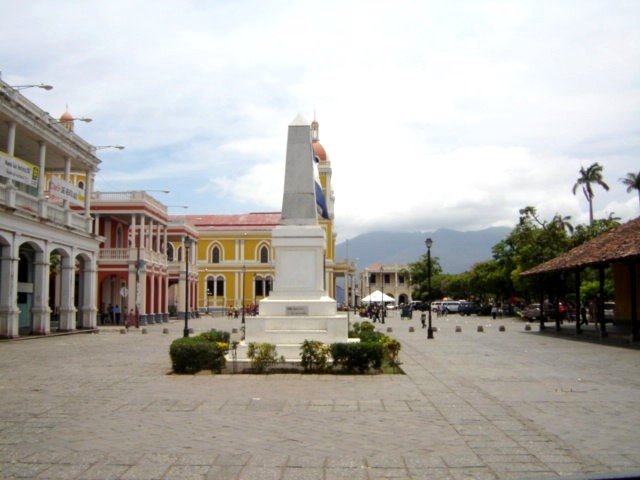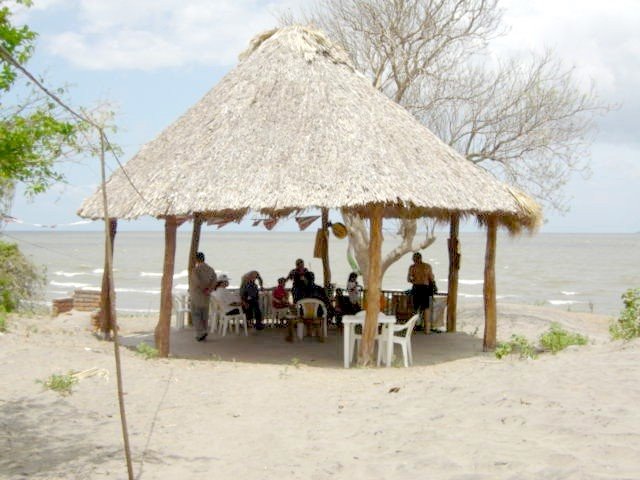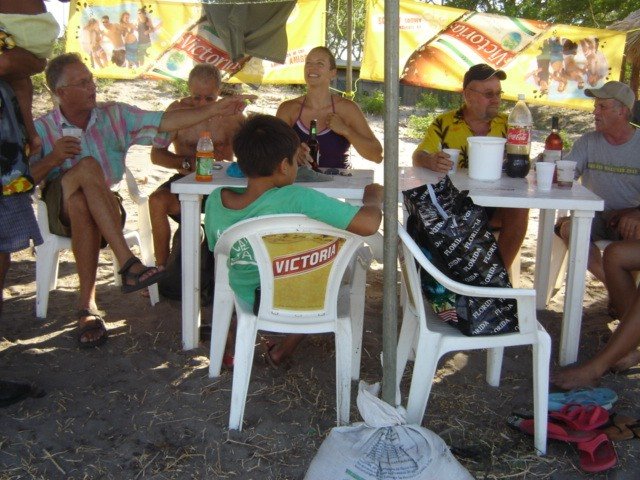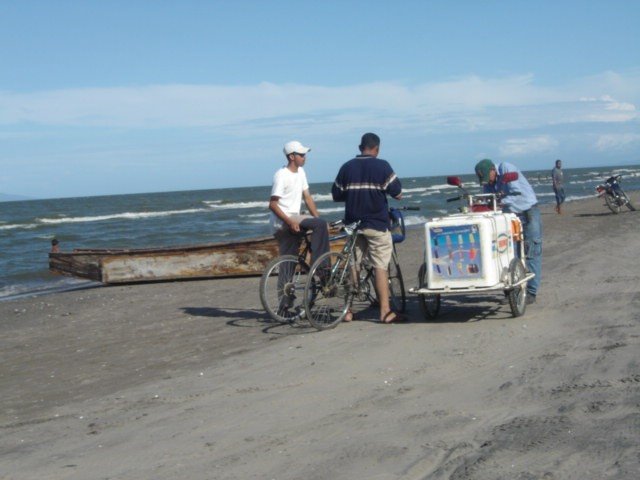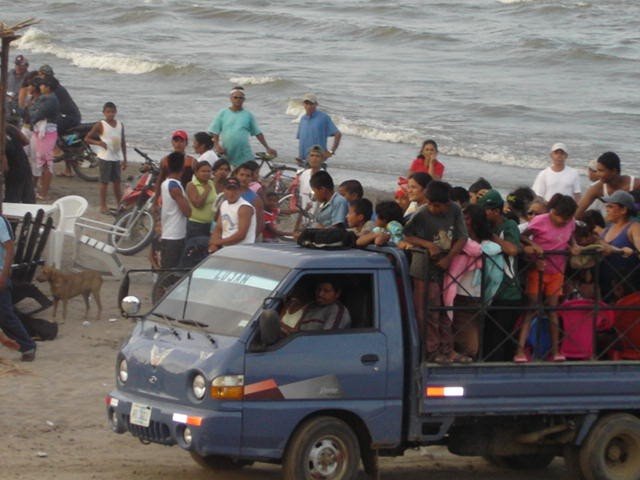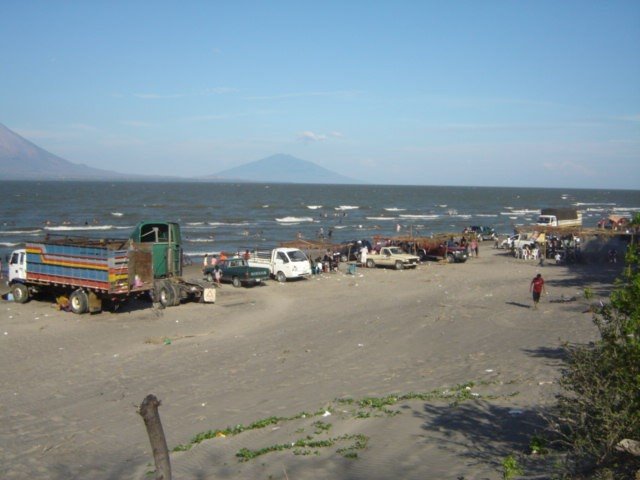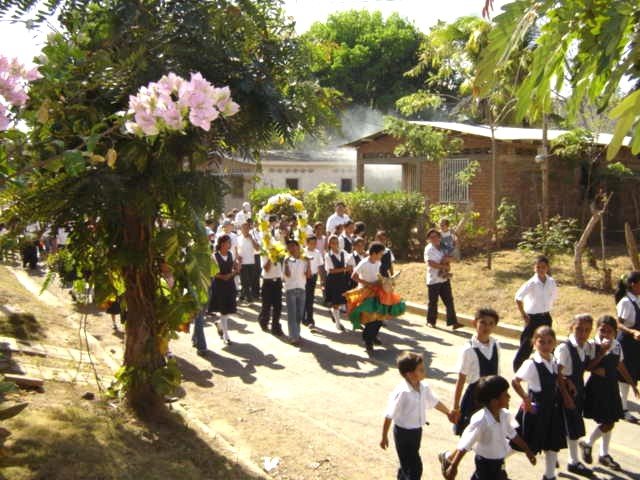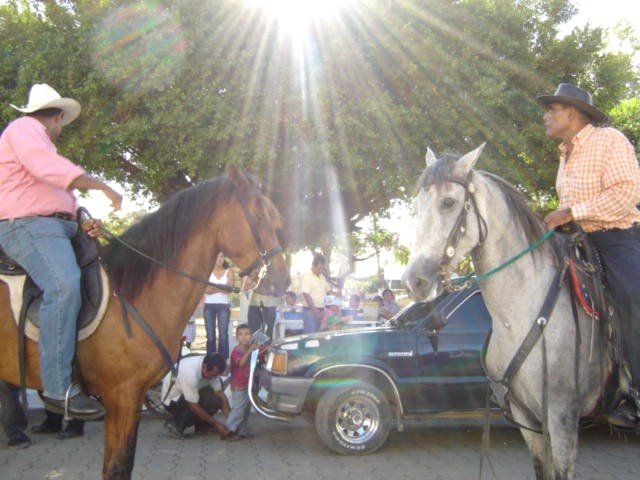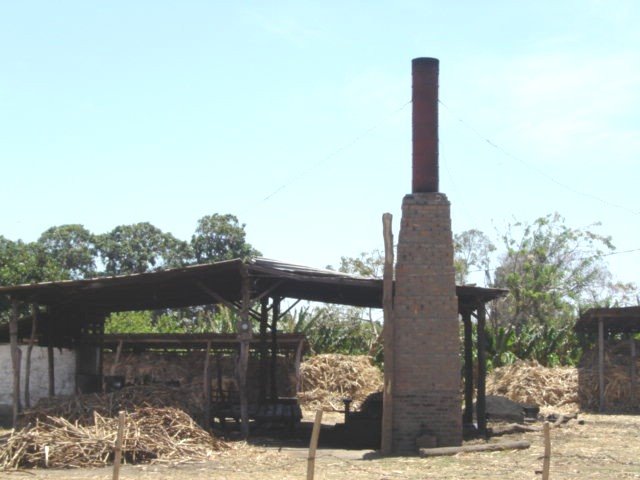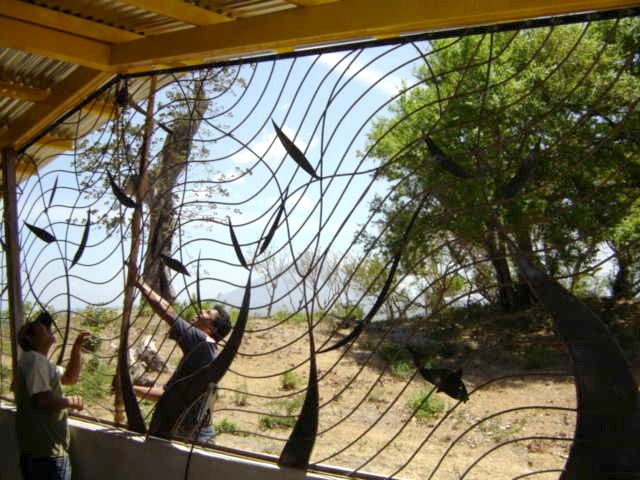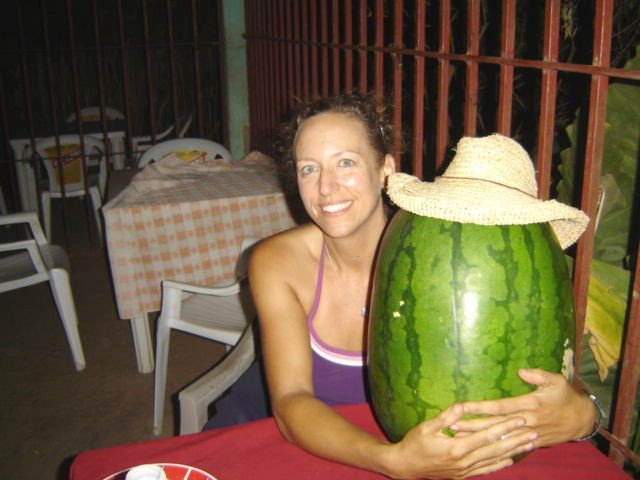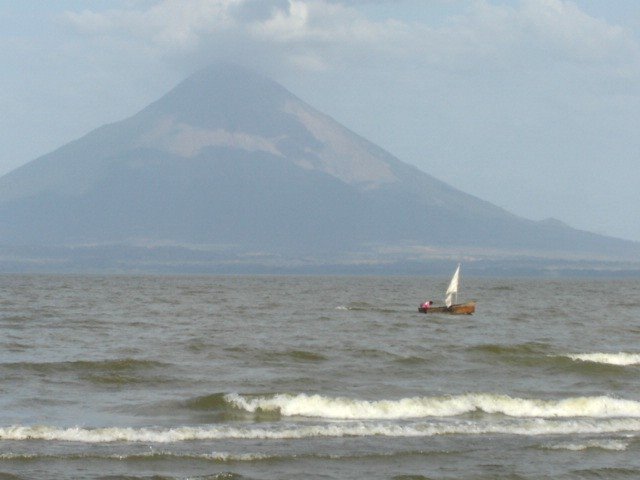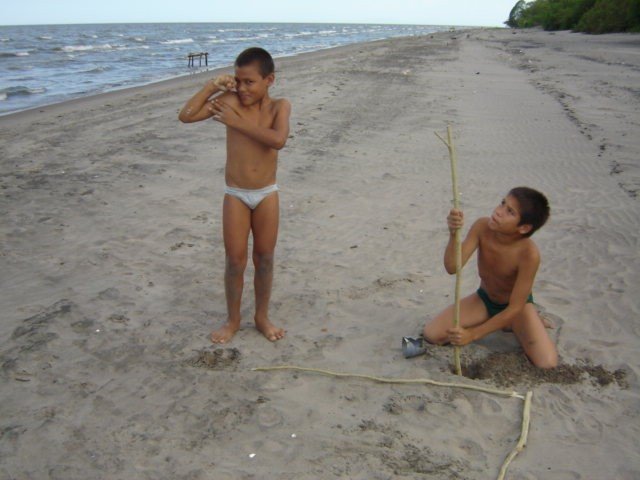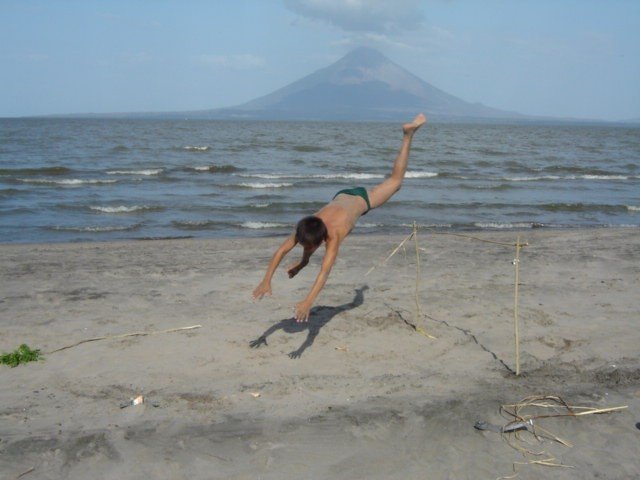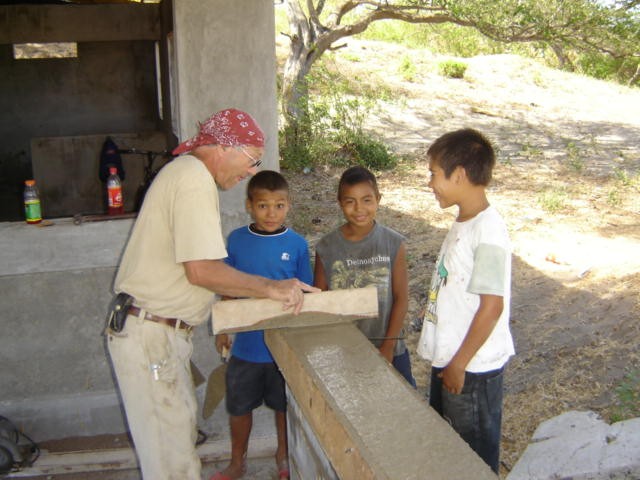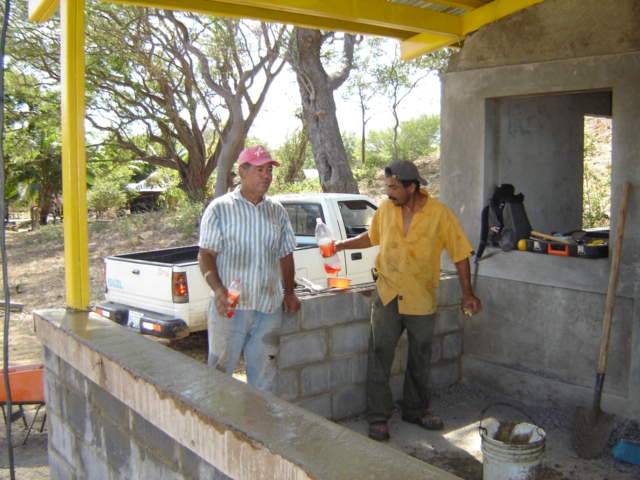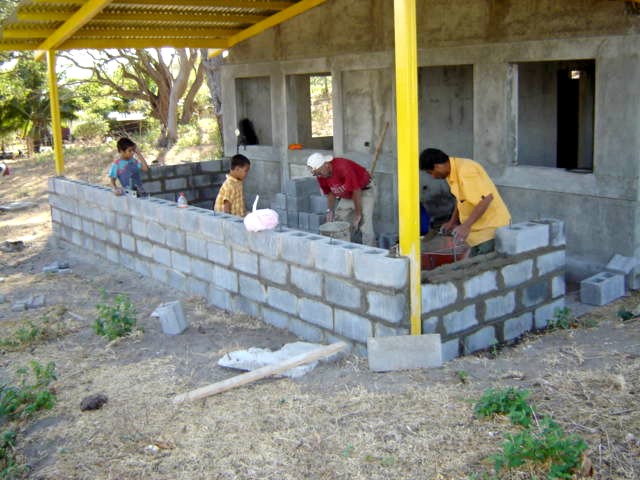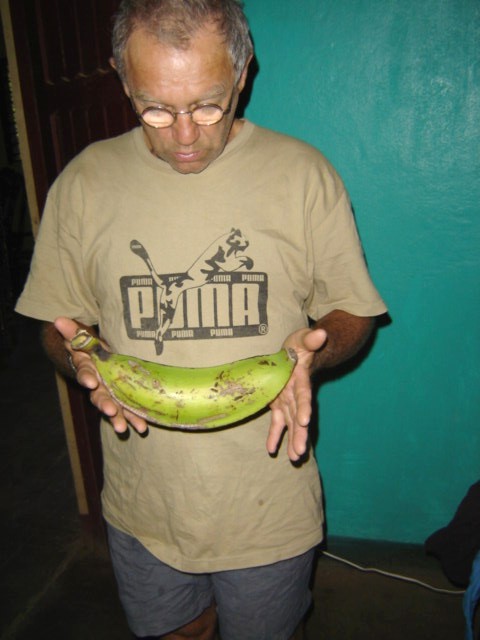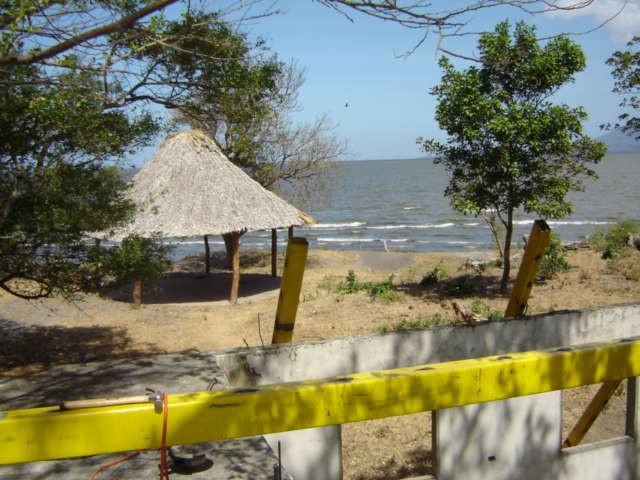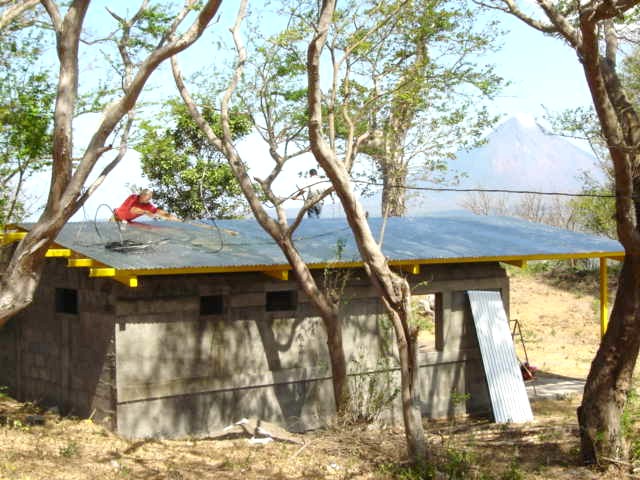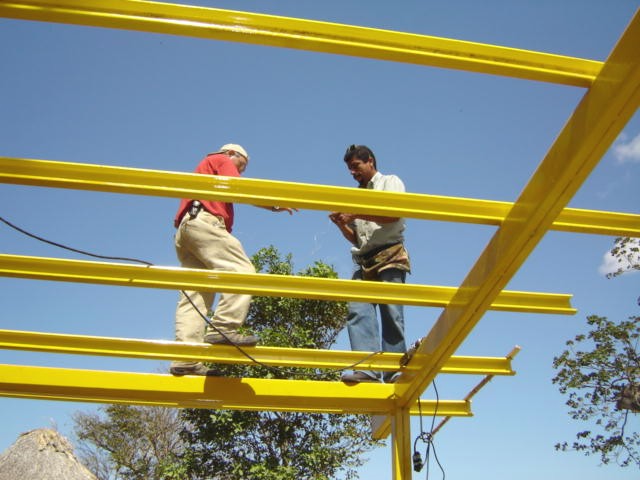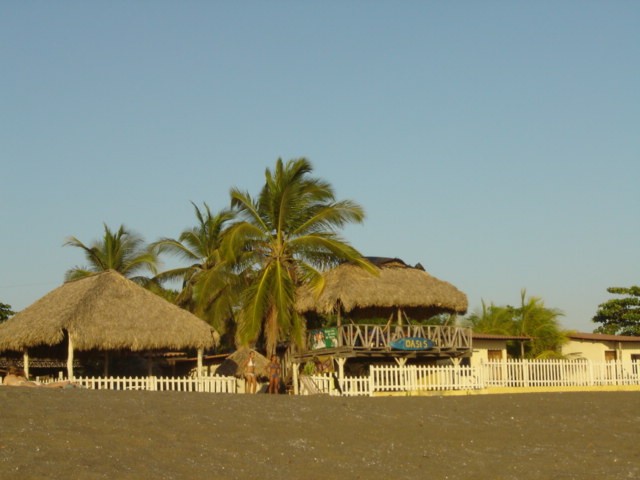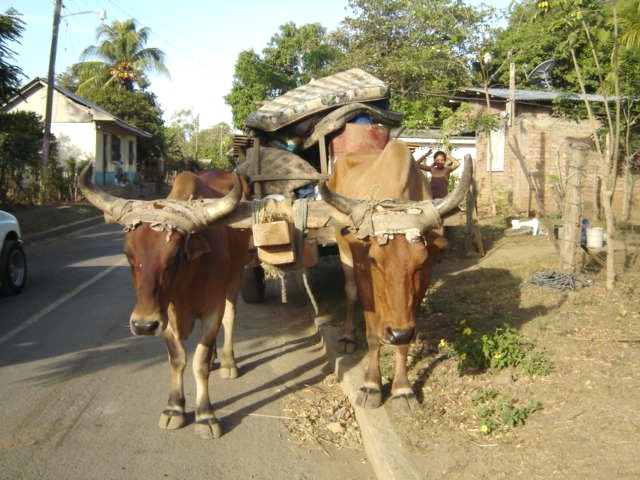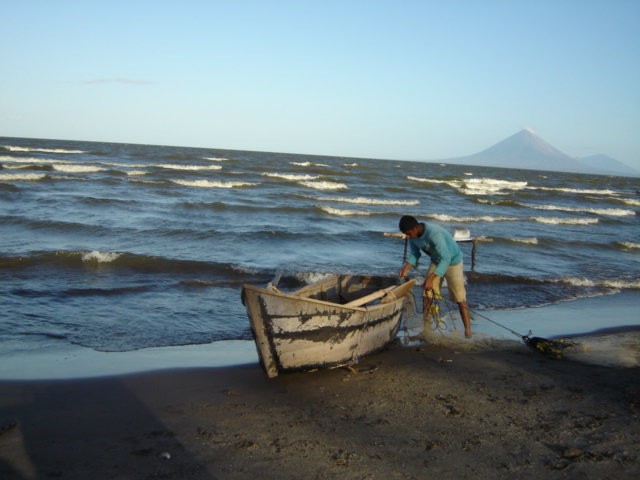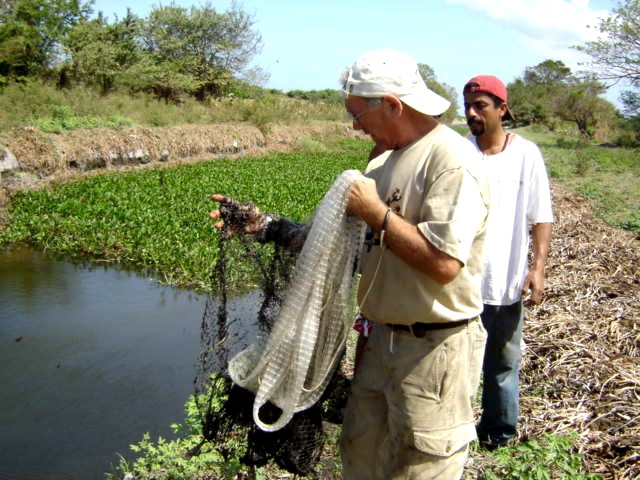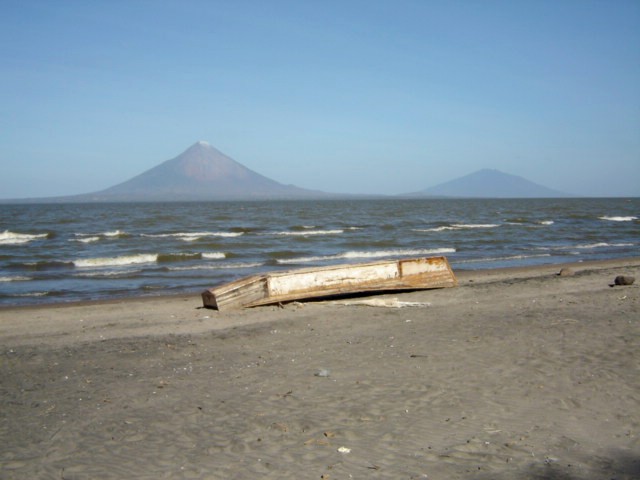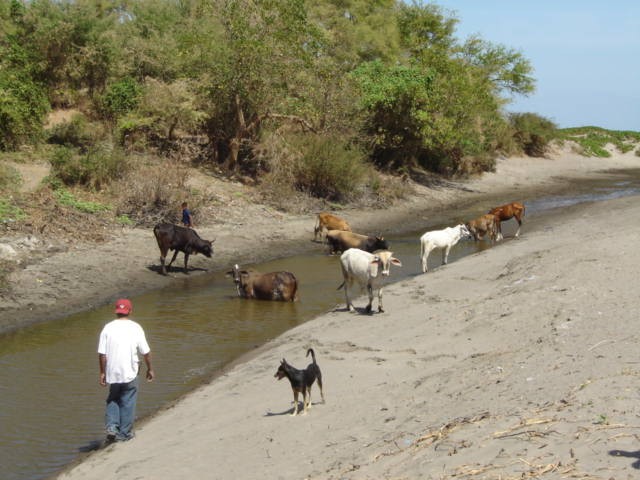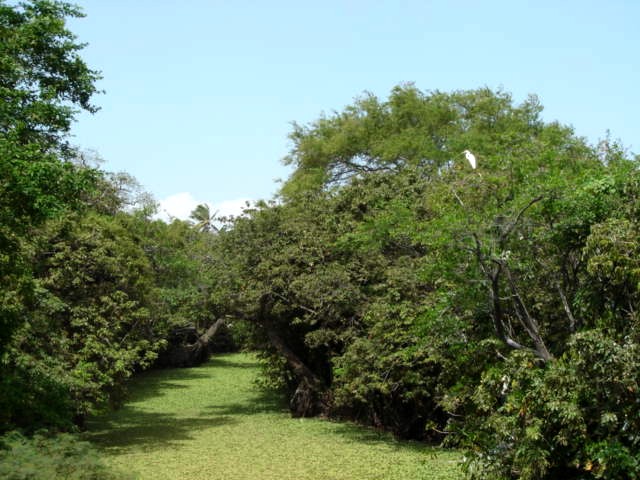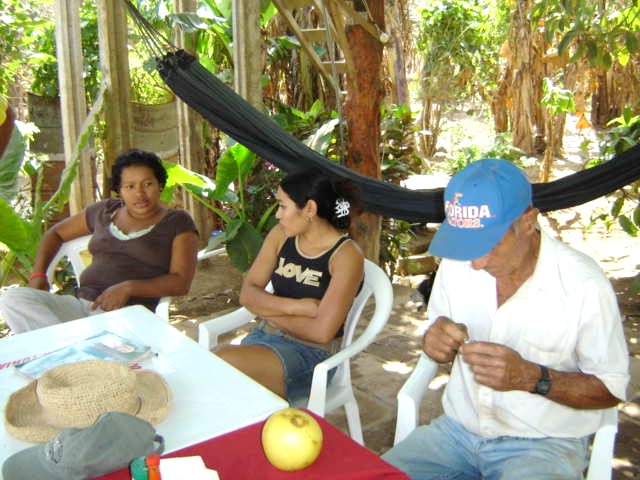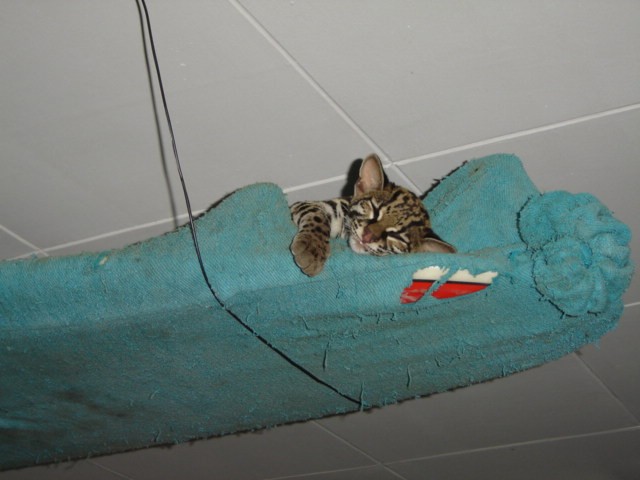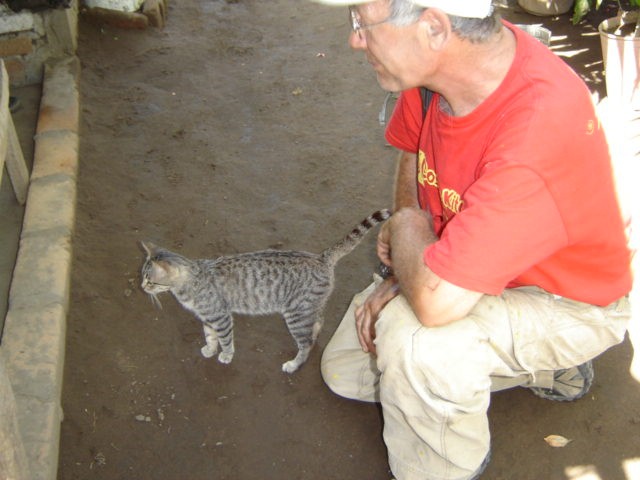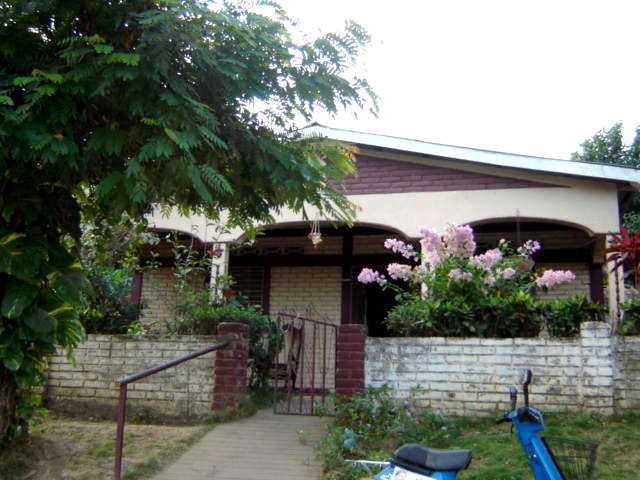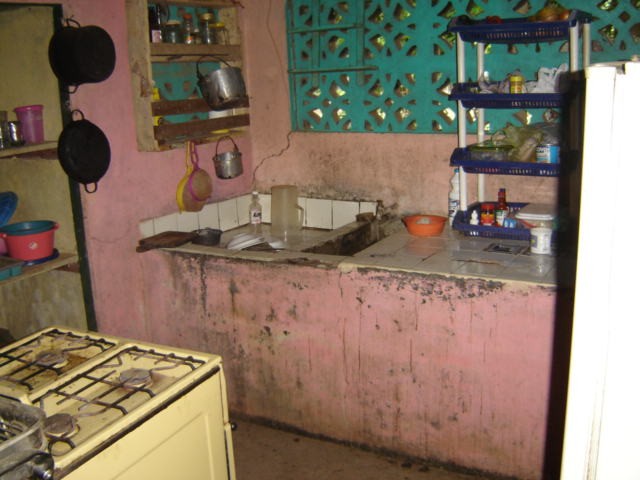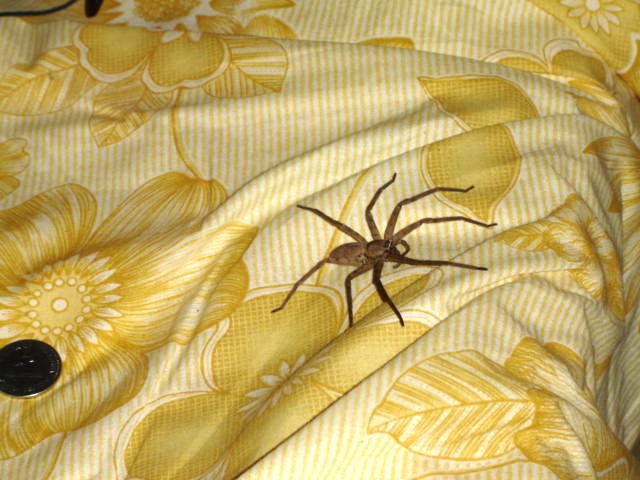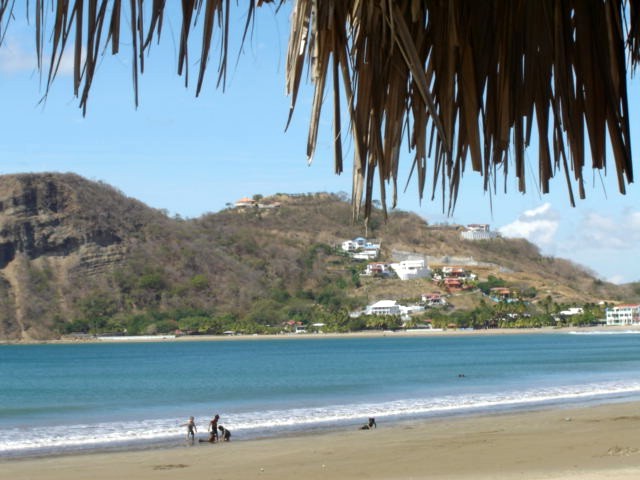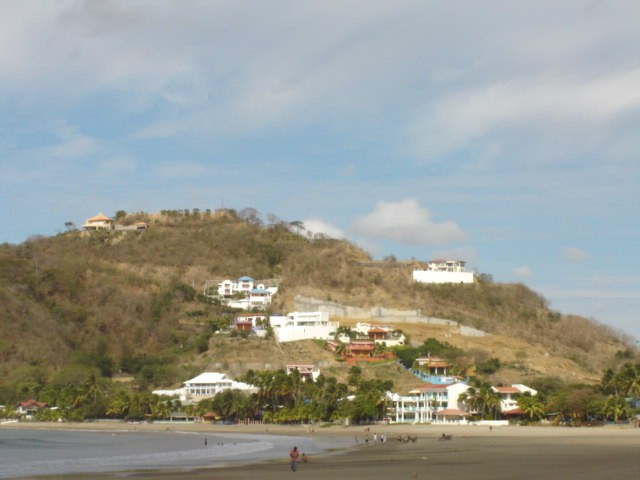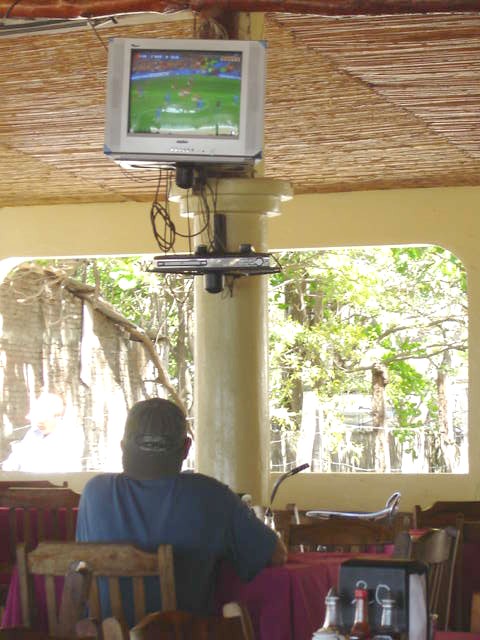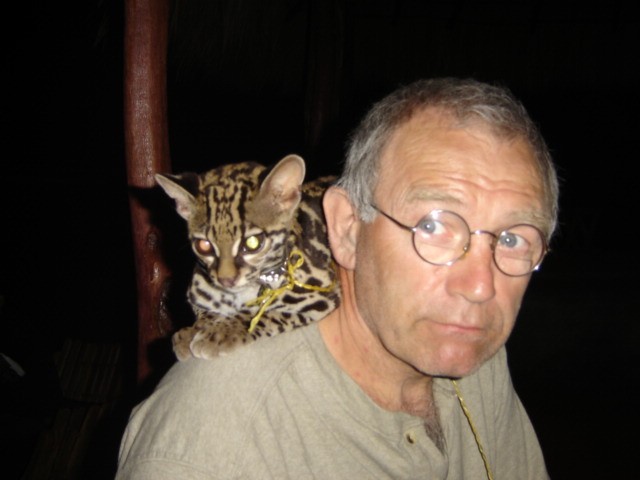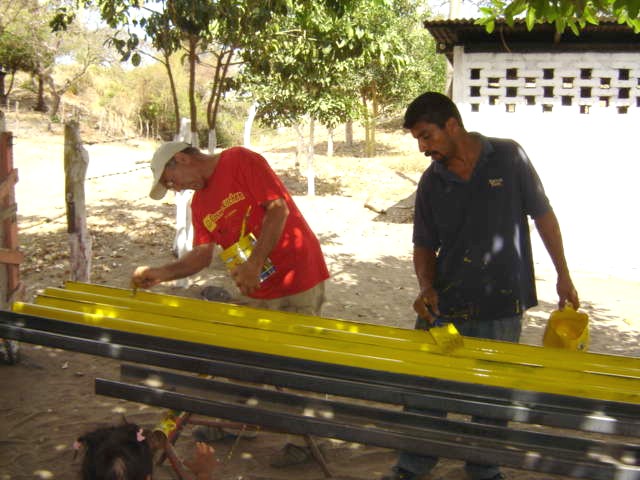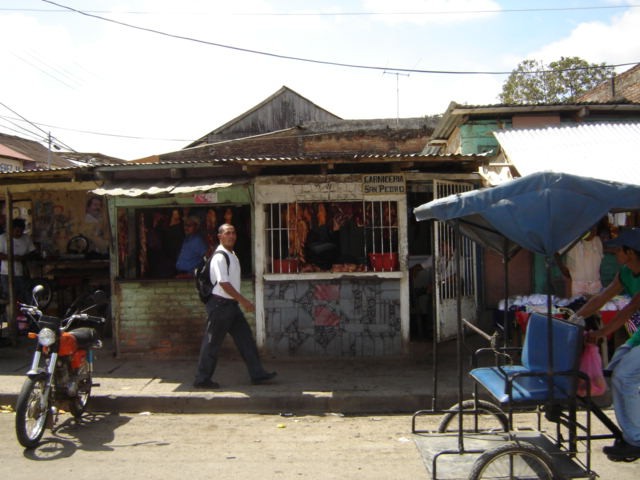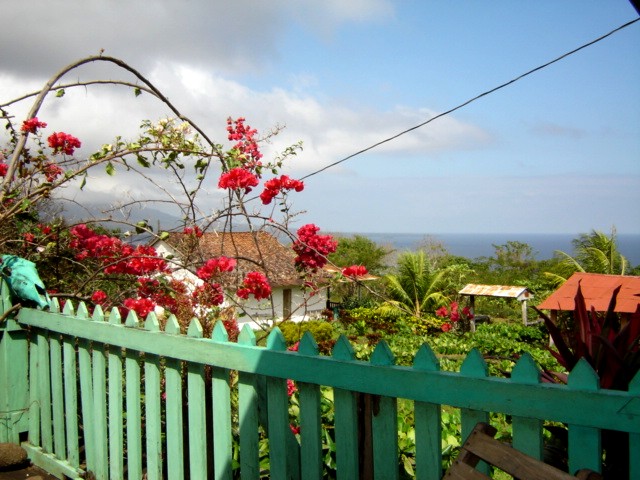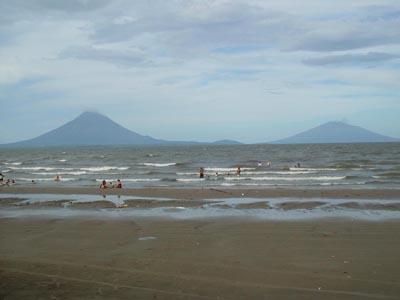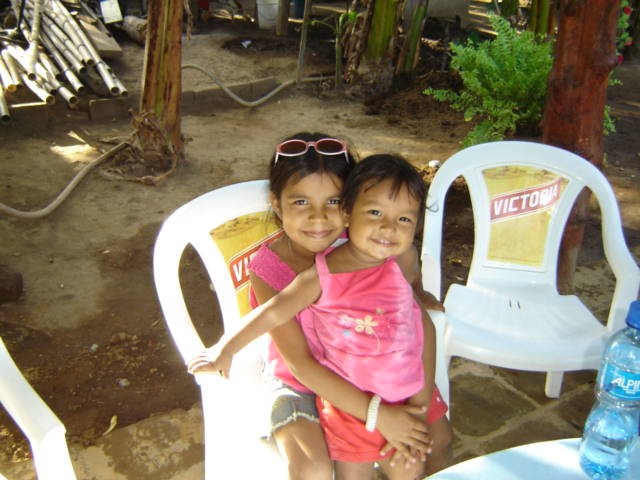Defining freedom. Last Saturday we stopped by Edwin and Reyna's to pick up Edwin's truck. We were only going to Rivas, but we've been told repeatedly, by everyone, that the stretch of road by the cemetery, basically a black hole at night in terms of visibility, is a favorite spot for ladrones, thieves, and while locals were vulnerable, as Gringos we would be especially tempting. We've done it as late as 9pm without problems, but as we were heading out to El Principe, Rivas' premiere nightspot, where in all likelihood I'd have at least a couple wee drinks, we gave in and borrowed the truck. It was a disco night at Edwin's, with an actual DJ and towering speakers. The music was blasting, and a good portion of Buenos Aires' finest were shaking their traceros to the gut-vibrating beat. And then Officer Amable showed up and had a word with the DJ. The DJ stopped the music and spoke into the mike. He told the happy people that the Policia Nacional had requested him to pack it up; there'd been a complaint about the music. The response? Immediate uproar, with everyone yelling abusive things at the cop, getting right in his face, telling him this was the only place to dance in B.A., that they'd worked hard all week and it was their right to blow off some steam, that it was only 8pm for crissakes! Then Edwin took the mike and made a short speech about local rights, and that they paid their taxes, but when he needed the cops last month to come arrest some drunken idiots who were trying to steal his electric cable, they told him no one was available. Reyna had a word with the DJ who took the mike back and announced the bar owners would be circulating a petition to show support for the disco. Throughout all this, the cop stood calmly in the middle of the dance floor, fending off jibes and verbal assaults from irritated patrons. Eventually he wandered back out into the street, Reyna turned on the bar's usual sound system, and the party resumed more or less undeterred.
Pat and I just stood aside, watching with considerable interest. While it's been quite a few years, I remember being at parties of such energy the cops couldn't possibly stay away. Inevitably, within moments of their arrival, dozens of drunken but basically meek partiers would be staggering docily out into the street with little more than a few murmurs of, "Awww, man, we weren't doing' nuthin' wrong…" or perhaps a "Lighten up, man, it's just music and beer…". But never once do I recall anyone showing actual defiance, let alone showering the officers in outright abuse. And yet here, in a country with a complex and very recent history of extreme military and National Police violence against innocents, kidnappings, torture, innumerable disappearances or unlikely "suicides", despite all this, the people fight for their rights without fear. Pat and I returned late that same night, after everyone had gone home, and sat and talked to Edwin and Reyna about the night's events. When Edwin told me it had been provoked by a neighbor's call, I said, "But you have music here six nights a week! And it was only 8:00 on a Saturday night! And what about all those little neighborhood Evangelical churches and their sing-a-longs? A dozen born again Christians yowling ditties about "El Seignor" at the top of their lungs three or four nights a week to the same three guitar chords? No one seems to complain about them!" (You can tell by my unusually excessive use of exclamation points how fired up I was.) They laughed and agreed and said it all about morditas, pay offs, and if they had slipped a few notes to the officer, he would've had a sudden change of heart. But as Edwin had said, they pay their taxes, they have all their licenses and whatnot in order, the police aren't doing what they're paid to do, so he sure as hell wasn't about to pay them off for something like this. He said he'd go down and have a talk with them on Monday, for as much good as that would do. Pat, upon hearing that the neighbor had called in because the music was disturbing his elderly mother, pointed out if she was all that elderly she was probably deaf anyway… As a follow-up, it was actually Reyna, with Milagro in tow, who went down to have a word with the police. They told her not to worry about it, that next time they just wanted advance notice, and that the cop had in fact been acting outside his official perimeters on behalf of a friend, and had been reprimanded. Reyna said all that was fine and good, but she was still skeptical, and perhaps she should have Edwin come down…a suggestion the chief vehemently argued was unnecessary. So much more pleasant dealing with the woman of the house…
The winds have returned and while they cool things down a bit, they also stir up the dust, pollen, and all the other man-made pesticides, herbicides, and insecticides so prevalent in this agricultural community. I had to put away my contacts for over a week when my left eye refused to relinquish a diabolical shade of red. After trying assorted over-the-counter drops, I finally went to a clinic and saw an actual eye specialist. He was quite the comedian as well. After learning a bit about me, and the talk had returned to the eye, he said, "Here in SW Nicaragua this sort of thing is very common. I tell my patients there are three courses of treatment available. The first is to build yourself a small room with no windows or doors and stay there until the wind stops. Obviously, this can present difficulties. Second, get yourself a scuba mask and wear it day and night. Clearly, this option too has its drawbacks. Finally, get a suitcase, pack your clothes, and buy a ticket to Alaska." (I soon disabused him of the misguided notion there was no dust in Alaska.) Then, when I noticed the halogen headlamp on his desk, identical to the ones Pat and I depend on all winter in Homer, and asked why he had it, he told me it was for when the power went out during surgery. "I always wear it, and if the lights go off, I just ask my nurse to switch it on. It's come in handy a few times now." Actually, in retrospect, I think he was probably serious about that one… He then asked me how much we'd paid for our property, and upon hearing the amount, asked if I knew of any other available land as he and his wife wanted to build a weekend house on the lake.
A few readers have written asking my opinion on the current political and social situation here. Typical of most administrations, the new Sandinista government spent the first month remodeling the President's House and throwing lavish celebratory parties. In an attempt to show the constituency a bit of what was to come, Daniel had his Secretary of Education declare all school fees (which had ranged from $2 to $10/mo) abolished, thus allowing children from even the poorest families to attend classes. A noble concept, except that it was done mere days before the new school year began on Jan. 29, and without any thought to the outcome. Predictably, the student-teacher ratio swelled from roughly 35-1 to, in some cases, over 75-1, resulting in a catastrophic shortage of rooms, books, desks, and sane teachers. Emergency meetings were called, teachers protested, parents complained, and many students fled to private schools, perhaps the only beneficiaries of the crisis. In the end, the government placed a 60-1 cap for now, while it desperately tries to recruit more teachers and hastily fling up a few more schools. Rumor has it they are counting on a huge attrition rate, as many of these kids are entering school for the first time at higher ages, and will more than likely give up from a combination of bullying, unsupportive parents, and general lack of commitment. All in all, a fine start for the new administration.
Beyond that, foreign investment still seems to be the prime focus, on all levels including individual, corporate, and in the form of international aid. We've heard that right in our little barrio of Tolasmaidas, 120 small, efficient, modern houses are to be built for the poorest families. (We're trying to determine how they decide who deserves a house. Possibly it concerns the number of viable chickens running about, or the quality of the dirt floor. Yes, I'm being facetious. With a couple exceptions, nearly everyone along our road would benefit from an actual house.) The funding and materials are from a US-based NGO with the initials INF. What we are having great difficulty in learning from our very secretive mayor, is who will be doing the actual construction. Pat feels strongly it should be the people who live here (most of whom are unemployed, work sporadically in the plantain and sugarcane fields, or do a little fishing) and will be living in the houses, along with a team of professionals to oversee and assist. Specifically, he wants it to be himself, Edwin, and a few other experienced locals. What we're hearing, however, is it will probably be a crew from Managua, which makes very little sense. Stand by for updates.
We recently went to the workshop of the carpenters who are making our windows and doors, to see the first completed window. They use a beautiful hardwood here, called "cedra", which is not cedar. It's extremely durable, and very strictly regulated. We are having seven large opening windows, one smaller sliding window, and a two-part, Dutch-style front door with round window made, plus installation, for around $1000. According to Pat, just one of these windows back home, assuming you could find such wood, might run as much as $600 or $700. The workmanship is quite good, if not flawless, and they should (operative word) be ready in a month or so.
In addition to Edwin and Julio and/or Chepe, Pat's acquired three additional helpers on the job. Boys from the neighborhood who have learned that by making themselves useful, they could earn a few cords a day. They help carrying all the tools, fetching things, running to the local shop for cold drinks and snacks, and pointing out any flaws they see as Pat and Edwin plaster the new wall. They also want to learn English, which is not taught at the local school (I'm asking around about that; perhaps I could do something there). So our first word, an easy one, was "gecko". As expected, they got it right off, and proceeded to spend the next hour until we left yelling "Gecko!" "Gecko!" at each other. I gave them "water" as well, which morphed into "Walter", the name of one of their uncles. The next day they worked on "See you tomorrow". As one of them, Donald said, very seriously, "Word by word, we'll learn to speak English. Then you can teach us French!"
Saturday, February 24, 2007
Friday, February 16, 2007
February 16, 2007
Happy belated Valentine's Day. We spent ours driving and sleeping, the former to return to Buenos Aires from our mini-vacation to the NW, the latter to recover from the last night of the mini-vacation during which we stayed up late drinking beer and having a deep, philosophical discussion with a couple Canadians and a dude from Kentucky. Now it's Friday the 16th, and I've just come from my first official Spanish class. A new school has opened up in Rivas, modeled after successful operations in other cities. One has the option of doing the complete program, with a homestay, four hours/day of instruction, afternoon and evening activities and side trips, and many meals, for the bargain price of $195/week all included. Since I can more or less manage most of that on my own, I just went for some private tutoring, three hours a day, for four sessions. So far, so good. They are currently working on a website, but if anyone is interested in combining a visit to us with a language/cultural experience, you can email them at info_nicaraoschool@yahoo.com .
Back to our trip. Pat & Edwin had gotten the roof on the house, so as a reward, we decided to check out another corner of the country and headed up to Leon. It's one of the oldest cities in Central America, and boasts one of the largest cathedrals in all of Latin America. This apparently the result of the blueprints getting accidentally swapped with the set destined for Lima, and rumor has it, the Peruvians are still bitter. We "rented" Sam's truck for the trip and headed up Monday morning. It took about three hours from Rivas, skirting Managua to the west. We'd been told by pretty much every foreigner we know to expect to get pulled over somewhere in the big city, for offenses real or imagined. Sure enough, as we were looking for the road to Leon a cop waved us over. (The vast majority of cops are on foot, stationed at strategic points throughout towns and cities where cars are moving slowly. With fearsome frequency, they catch your eye and gesture to the side of the road.) We did as he asked, and he came up to the car. He asked for Pat's license and registration, which we handed over. He began to explain how he would keep the license until we'd gone to some bank and paid a fine of 500 cordobas (about $28) at which point the bank would notify the police station and they would mail back the license. This is how it's officially done. But we'd been coached in the alternate route, and I began explaining how Pat needed his license for ID, and couldn't we take care of it all here and now. He said no, and then asked where we were going. "Leon, via Nagrote," I said. "Nagarote! Ok, when you get there, you have to find this little quesilla restaurant—they make the best, and they also sell ceramics." (Quesillas consist of a corn tortilla wrapped around a slice of mozzarella-like cheese, folded into a cone shape, and filled with diced onions and sour cream. They're actually pretty tasty.) "Um, ok, sure, we'll do that…" He then began writing out the ticket, explaining again about the bank, etc, so I began again about needing to keep the license and dug out my wallet. He glanced at it, looked around quickly, and then handed Pat a Nicaraguan driver's manual. "What am I supposed to do with this? I can't read Span…ohhh…you think we're supposed to put the money in it?" "I think so. Oh damn, I only have 500 cord notes, and everyone told us 100 usually does it." "Well I doubt he'll give us change, so, it's that or lose the license and pay the same amount." So we tucked the note between the pages, handed back the book, and watched as his eyes widened when he saw the denomination. (Edwin told us later that the average cop makes about 100 cords a day. We'd just handed him a week's salary.) He then reiterated his restaurant recommendation, told us a shorter way to get onto the highway, and waved us on our way. After that, we made sure to always have a 100 cord note handy, but didn't get stopped again.
It was a good trip, and although I filled pages about it, I won't bore the lot of you with all the details. Suffice to say that Leon is the badly treated, rarely fed, seldom cleaned bastard child of most European cities. There are dozens of cathedrals and churches, and hundreds of beggars, (Rivas has two churches and very few beggars, which makes me ponder the connection…) some lovely parks, oodles of foreigners, and at least one decent hardware store which had Pat salivating and stroking chainsaws and circular saws with a disturbingly lascivious look. We wandered semi-aimlessly for a few hours, repeatedly commenting on how it was so much hotter up there (at least 5-10 degrees), and how much dirtier. In the process of locating a local lawyer's office to pick up some papers for Sam, we ran into a guy from New York. He seemed interesting, and invited us back to his house that evening. Turns out he'd lived in Leon for twelve years, built a theater/ public arts space (he gave us a tour-it's very impressive), and was now building a small hotel. In his spare time he goes into the poorest barrios and builds $2000 houses for the homeless. We talked for hours, and will keep in touch.
The next day we headed for the coast. The NW Pacific has some lovely beaches and is starting to attract a fair bit of investment interest (though nothing like SJDS. Yet.) We stopped at the first, Poneloya, for a typical Nica breakfast of gallo pinto (beans & rice), scrambled eggs, sautéed plantains, and coffee, then headed on to the other beach, Las Peñitas. It was a rough road, but we bounced to the end, passing all sorts of beach houses. Beautiful mansions stood beside crumbling shacks, with a good number of guesthouses in between. The place was crawling with backpackers. At first we thought we'd just drive through, then head back towards Leon, and perhaps up to the industrial city of Chinandega, or maybe the port of Corinto, but then Pat spotted a couple of fishing boats pulling in and stopped to see what they'd caught. Fresh mackerel, snapper, a few small lobsters, and some flat silver things whose name I can't recall. He turned to me and said, "I don't really feel like spending the day driving. How about staying here and just relaxing?" "Sounds good to me." We went to the closest guesthouse, but it was full. So we stopped in at the next place down, and a sprightly woman of indeterminable ethnic origin replied that they did have a room. By now we'd established that English was also her first language, being of (East) Indian and African parentage, raised in Kenya, educated in England, and over 30 years in Toronto. Her real name was Shamin but she told us her husband, Gordon, A Scots-Canadian, called her Pita for Pain In The Ass, and so all the locals followed suit and the name stuck. She mentioned they'd only been open about six weeks, and were still working out some kinks. Pat immediately offered his services, and she just as quickly asked if he could replace some door locks and figure out why the pool, barely in use, was so filthy. Ecstatic to have something useful to do, he set to work on the pool problem until Gordon came back from Leon with the new locks. Where Pita is short and curvy with a devilish pixie-like quality, Gordon is tall, slender, bald, bearded, and bespectacled, with a dry wit and ready wink. They're both in their mid-50's I think, and had been together for 26 years. Their first anniversary in Nicaragua was approaching, and so far, they were very happy with their decision to relocate from Toronto.
By late afternoon, Pat and Gordon had done as much as they could with the locks and the pool, and Pita & I had chatted and played backgammon. Pat & I decided to take a walk back down the road, for a closer look at some of the houses, and also along the beach to enjoy the sunset. We met an older Nica woman called Dora who was supervising the construction of her new beach house. She has eight grown children, all living in the US, and all of whom like to come home to Nicaragua to party during Semana Santa, the week before Easter when this country goes crazy. We promised to come back in a couple months to see how the place was turning out. Further along, we spotted a foreigner in his yard and met Stevan and Lisa, a couple from BC who had just completed construction on a lovely little place. They plan to spend a couple months a year on the beach for now, and maybe in the future, to split the year more evenly. (We felt an immediate connection to them, due, I suspect, to their innate Homerite-ness.)
Back at the guesthouse, Pita cooked up a wicked Indian curry, and we started talking to another foreigner who'd been in to use their internet. Ray began his life in Canada, but has spent nearly all of it in the US, first Texas, and the last 30 years in Kentucky. He's a contractor, but was taking four months off to drive from Kentucky to Panama and back. In an old Dodge Caravan. By himself. Since Pat and I had been toying with the idea of making that drive (well, minus the Kentucky bit), we wanted to hear his stories. We no longer are thinking about making this drive. He turned out to be a very cool guy, an NPR-listening, off-the-map traveling, helping the locals type, and we had a lot to talk about. (This is where all the beer came in.) And the next morning we headed back home.
Work on the house came to a screeching halt the other morning when Pat realized that by relying solely on Edwin's ancient Black & Decker drill (we're talking late '70's here), it would take approximately forever to screw down the roof. And that's assuming the poor thing didn't burn itself out first. So an hour after he left for work Pat & Edwin were back here to fetch me and head into Rivas on an impact driver quest. They would've had a better chance of finding the Holy Grail. We went to every tool store and kiosk in town, roughly half a dozen, and although everyone had something, no one had the prize: a Makita, or at least a Hitachi. And forget anything cordless with the torque required. When we did find one semi-acceptable cordless version, it only came with one battery and was priced on par with a night at the Plaza Hotel. No thanks. Finally, in desperation, he settled on a Mexican model with cord. For $75, it actually did the job as advertised, and by 4pm, we had a nearly completed roof.
Now the thing about our roof is, it's strong enough to support a helipad but is currently covered with sheets of corrugated tin barely thicker than Reynold's Wrap. Why? Because when we were discussing roof ideas with Edwin, Pat mentioned the whole living roof concept and gave a detailed description of how it worked. Edwin figured, correctly, that this sort of roof was extremely heavy, and decided to build us a structure that could support a couple tons of earth and perhaps a pelibuey or two (remember last blog's picture of the sheep-like critter?) to keep the grass short. Now all we need to do is find some turf and we'll be in business.
I mentioned Julio, our caretaker and recently, a laborer on the house. Except the thing with Julio is, given the choice between working and drinking, the bottle always wins. So after three days and a morning actually being useful (and getting paid), he disappeared for a night (really annoying his teenagers) and staggered home midday reeking of cheap alcohol and telling Edwin all about his new sweetie. (His wife left him last year for some sober guy on Omotepe.) Fortunately for us, Chepe came by and agreed to fill in till the roof was done. he's as good a worker as he is net thrower, so things got done quickly. Other ex-pats we've talked to like to go on about how lazy the locals are, and how they hate to work, preferring to lie about in hammocks all day, sipping guaron (basically, grain alcohol made from sugarcane) and thinking about how they can steal from gringos. This train of thought, obviously, is more than a little offensive, and we have tended to ignore it. And when I watch Edwin & Reyna (she runs the bar & restaurant, has a hair & make up business, and takes care of the two kids, Edwin's father, and all the other everyday stuff), lazy is the last word that comes to mind. And then there's Julio….
They have these ducks here called piches, a sort of small duck that whistles rather than quacks and is apparently very tasty. We heard that the other day a salesman stopped by the house of the Canadian (Howard) who's raising Tigressa. He had a bag of these piches, very much alive and whistling away. Tigressa leapt down from her surfboard retreat and attached herself to the bag of ducks, growling ferociously at the terrified fowl through the burlap. The salesman freaked out and started screaming. Howard grabbed the cat and started pulling one way while the salesman pulled on the bag, but Tigressa wasn't about to give up so easily. After several minutes of a very noisy tug-of-war, Howard was finally able to disengage his wee wildcat from the trembling sack, and apologized to the salesman who simply fled. And now Howard's talking about getting a male so he can breed the damn things…
Last Sunday at around 7am we heard a lot of activity outside and got up to see what was happening. In the street stood a team of large oxen, hitched to a rickety cart onto which the meager belongings of the large family in the shack across the way were being loaded. In less than 45 minutes everything they owned was piled on and tied down and away they rolled. Not an hour later another cart pulled up, this one behind a mere horse, and a woman and two children began carrying their possessions into the house. I had been told it was almost impossible to find a rental house in Buenos Aires; if the transitions are always this rapid, it must be true. I later asked Reinaldo where the original family had gone to, a bit concerned they'd been evicted, but he said they'd just moved to a slightly larger house a couple blocks over.
Now it's Friday, and although we spent most of the week away, we feel ready for the weekend. Some grilled chicken tonight, and maybe a visit to the local disco on Saturday for some Cumbia and Merengue. Sunday looks like a bike ride across the city to visit an American-Nica couple, the female half of which makes a mean ceviche.
Back to our trip. Pat & Edwin had gotten the roof on the house, so as a reward, we decided to check out another corner of the country and headed up to Leon. It's one of the oldest cities in Central America, and boasts one of the largest cathedrals in all of Latin America. This apparently the result of the blueprints getting accidentally swapped with the set destined for Lima, and rumor has it, the Peruvians are still bitter. We "rented" Sam's truck for the trip and headed up Monday morning. It took about three hours from Rivas, skirting Managua to the west. We'd been told by pretty much every foreigner we know to expect to get pulled over somewhere in the big city, for offenses real or imagined. Sure enough, as we were looking for the road to Leon a cop waved us over. (The vast majority of cops are on foot, stationed at strategic points throughout towns and cities where cars are moving slowly. With fearsome frequency, they catch your eye and gesture to the side of the road.) We did as he asked, and he came up to the car. He asked for Pat's license and registration, which we handed over. He began to explain how he would keep the license until we'd gone to some bank and paid a fine of 500 cordobas (about $28) at which point the bank would notify the police station and they would mail back the license. This is how it's officially done. But we'd been coached in the alternate route, and I began explaining how Pat needed his license for ID, and couldn't we take care of it all here and now. He said no, and then asked where we were going. "Leon, via Nagrote," I said. "Nagarote! Ok, when you get there, you have to find this little quesilla restaurant—they make the best, and they also sell ceramics." (Quesillas consist of a corn tortilla wrapped around a slice of mozzarella-like cheese, folded into a cone shape, and filled with diced onions and sour cream. They're actually pretty tasty.) "Um, ok, sure, we'll do that…" He then began writing out the ticket, explaining again about the bank, etc, so I began again about needing to keep the license and dug out my wallet. He glanced at it, looked around quickly, and then handed Pat a Nicaraguan driver's manual. "What am I supposed to do with this? I can't read Span…ohhh…you think we're supposed to put the money in it?" "I think so. Oh damn, I only have 500 cord notes, and everyone told us 100 usually does it." "Well I doubt he'll give us change, so, it's that or lose the license and pay the same amount." So we tucked the note between the pages, handed back the book, and watched as his eyes widened when he saw the denomination. (Edwin told us later that the average cop makes about 100 cords a day. We'd just handed him a week's salary.) He then reiterated his restaurant recommendation, told us a shorter way to get onto the highway, and waved us on our way. After that, we made sure to always have a 100 cord note handy, but didn't get stopped again.
It was a good trip, and although I filled pages about it, I won't bore the lot of you with all the details. Suffice to say that Leon is the badly treated, rarely fed, seldom cleaned bastard child of most European cities. There are dozens of cathedrals and churches, and hundreds of beggars, (Rivas has two churches and very few beggars, which makes me ponder the connection…) some lovely parks, oodles of foreigners, and at least one decent hardware store which had Pat salivating and stroking chainsaws and circular saws with a disturbingly lascivious look. We wandered semi-aimlessly for a few hours, repeatedly commenting on how it was so much hotter up there (at least 5-10 degrees), and how much dirtier. In the process of locating a local lawyer's office to pick up some papers for Sam, we ran into a guy from New York. He seemed interesting, and invited us back to his house that evening. Turns out he'd lived in Leon for twelve years, built a theater/ public arts space (he gave us a tour-it's very impressive), and was now building a small hotel. In his spare time he goes into the poorest barrios and builds $2000 houses for the homeless. We talked for hours, and will keep in touch.
The next day we headed for the coast. The NW Pacific has some lovely beaches and is starting to attract a fair bit of investment interest (though nothing like SJDS. Yet.) We stopped at the first, Poneloya, for a typical Nica breakfast of gallo pinto (beans & rice), scrambled eggs, sautéed plantains, and coffee, then headed on to the other beach, Las Peñitas. It was a rough road, but we bounced to the end, passing all sorts of beach houses. Beautiful mansions stood beside crumbling shacks, with a good number of guesthouses in between. The place was crawling with backpackers. At first we thought we'd just drive through, then head back towards Leon, and perhaps up to the industrial city of Chinandega, or maybe the port of Corinto, but then Pat spotted a couple of fishing boats pulling in and stopped to see what they'd caught. Fresh mackerel, snapper, a few small lobsters, and some flat silver things whose name I can't recall. He turned to me and said, "I don't really feel like spending the day driving. How about staying here and just relaxing?" "Sounds good to me." We went to the closest guesthouse, but it was full. So we stopped in at the next place down, and a sprightly woman of indeterminable ethnic origin replied that they did have a room. By now we'd established that English was also her first language, being of (East) Indian and African parentage, raised in Kenya, educated in England, and over 30 years in Toronto. Her real name was Shamin but she told us her husband, Gordon, A Scots-Canadian, called her Pita for Pain In The Ass, and so all the locals followed suit and the name stuck. She mentioned they'd only been open about six weeks, and were still working out some kinks. Pat immediately offered his services, and she just as quickly asked if he could replace some door locks and figure out why the pool, barely in use, was so filthy. Ecstatic to have something useful to do, he set to work on the pool problem until Gordon came back from Leon with the new locks. Where Pita is short and curvy with a devilish pixie-like quality, Gordon is tall, slender, bald, bearded, and bespectacled, with a dry wit and ready wink. They're both in their mid-50's I think, and had been together for 26 years. Their first anniversary in Nicaragua was approaching, and so far, they were very happy with their decision to relocate from Toronto.
By late afternoon, Pat and Gordon had done as much as they could with the locks and the pool, and Pita & I had chatted and played backgammon. Pat & I decided to take a walk back down the road, for a closer look at some of the houses, and also along the beach to enjoy the sunset. We met an older Nica woman called Dora who was supervising the construction of her new beach house. She has eight grown children, all living in the US, and all of whom like to come home to Nicaragua to party during Semana Santa, the week before Easter when this country goes crazy. We promised to come back in a couple months to see how the place was turning out. Further along, we spotted a foreigner in his yard and met Stevan and Lisa, a couple from BC who had just completed construction on a lovely little place. They plan to spend a couple months a year on the beach for now, and maybe in the future, to split the year more evenly. (We felt an immediate connection to them, due, I suspect, to their innate Homerite-ness.)
Back at the guesthouse, Pita cooked up a wicked Indian curry, and we started talking to another foreigner who'd been in to use their internet. Ray began his life in Canada, but has spent nearly all of it in the US, first Texas, and the last 30 years in Kentucky. He's a contractor, but was taking four months off to drive from Kentucky to Panama and back. In an old Dodge Caravan. By himself. Since Pat and I had been toying with the idea of making that drive (well, minus the Kentucky bit), we wanted to hear his stories. We no longer are thinking about making this drive. He turned out to be a very cool guy, an NPR-listening, off-the-map traveling, helping the locals type, and we had a lot to talk about. (This is where all the beer came in.) And the next morning we headed back home.
Work on the house came to a screeching halt the other morning when Pat realized that by relying solely on Edwin's ancient Black & Decker drill (we're talking late '70's here), it would take approximately forever to screw down the roof. And that's assuming the poor thing didn't burn itself out first. So an hour after he left for work Pat & Edwin were back here to fetch me and head into Rivas on an impact driver quest. They would've had a better chance of finding the Holy Grail. We went to every tool store and kiosk in town, roughly half a dozen, and although everyone had something, no one had the prize: a Makita, or at least a Hitachi. And forget anything cordless with the torque required. When we did find one semi-acceptable cordless version, it only came with one battery and was priced on par with a night at the Plaza Hotel. No thanks. Finally, in desperation, he settled on a Mexican model with cord. For $75, it actually did the job as advertised, and by 4pm, we had a nearly completed roof.
Now the thing about our roof is, it's strong enough to support a helipad but is currently covered with sheets of corrugated tin barely thicker than Reynold's Wrap. Why? Because when we were discussing roof ideas with Edwin, Pat mentioned the whole living roof concept and gave a detailed description of how it worked. Edwin figured, correctly, that this sort of roof was extremely heavy, and decided to build us a structure that could support a couple tons of earth and perhaps a pelibuey or two (remember last blog's picture of the sheep-like critter?) to keep the grass short. Now all we need to do is find some turf and we'll be in business.
I mentioned Julio, our caretaker and recently, a laborer on the house. Except the thing with Julio is, given the choice between working and drinking, the bottle always wins. So after three days and a morning actually being useful (and getting paid), he disappeared for a night (really annoying his teenagers) and staggered home midday reeking of cheap alcohol and telling Edwin all about his new sweetie. (His wife left him last year for some sober guy on Omotepe.) Fortunately for us, Chepe came by and agreed to fill in till the roof was done. he's as good a worker as he is net thrower, so things got done quickly. Other ex-pats we've talked to like to go on about how lazy the locals are, and how they hate to work, preferring to lie about in hammocks all day, sipping guaron (basically, grain alcohol made from sugarcane) and thinking about how they can steal from gringos. This train of thought, obviously, is more than a little offensive, and we have tended to ignore it. And when I watch Edwin & Reyna (she runs the bar & restaurant, has a hair & make up business, and takes care of the two kids, Edwin's father, and all the other everyday stuff), lazy is the last word that comes to mind. And then there's Julio….
They have these ducks here called piches, a sort of small duck that whistles rather than quacks and is apparently very tasty. We heard that the other day a salesman stopped by the house of the Canadian (Howard) who's raising Tigressa. He had a bag of these piches, very much alive and whistling away. Tigressa leapt down from her surfboard retreat and attached herself to the bag of ducks, growling ferociously at the terrified fowl through the burlap. The salesman freaked out and started screaming. Howard grabbed the cat and started pulling one way while the salesman pulled on the bag, but Tigressa wasn't about to give up so easily. After several minutes of a very noisy tug-of-war, Howard was finally able to disengage his wee wildcat from the trembling sack, and apologized to the salesman who simply fled. And now Howard's talking about getting a male so he can breed the damn things…
Last Sunday at around 7am we heard a lot of activity outside and got up to see what was happening. In the street stood a team of large oxen, hitched to a rickety cart onto which the meager belongings of the large family in the shack across the way were being loaded. In less than 45 minutes everything they owned was piled on and tied down and away they rolled. Not an hour later another cart pulled up, this one behind a mere horse, and a woman and two children began carrying their possessions into the house. I had been told it was almost impossible to find a rental house in Buenos Aires; if the transitions are always this rapid, it must be true. I later asked Reinaldo where the original family had gone to, a bit concerned they'd been evicted, but he said they'd just moved to a slightly larger house a couple blocks over.
Now it's Friday, and although we spent most of the week away, we feel ready for the weekend. Some grilled chicken tonight, and maybe a visit to the local disco on Saturday for some Cumbia and Merengue. Sunday looks like a bike ride across the city to visit an American-Nica couple, the female half of which makes a mean ceviche.
Wednesday, February 7, 2007
February 7th, 2007
Feb. 6th
Pat woke me at 4am this morning to tell me Buenos Aires was on fire. I suggested it was the sunrise, but he countered that he was facing NW. I followed him out to the porch and found the sky glowing a deep orange, perhaps three or four kilometers away. We decided it must be intentional, farmers burning their fields, and confirmed it later with Reinaldo. Burning is an integral part of the sugarcane harvest, and when we biked by later, the air was filled with a sweetness that made our mouths water. Trickles of residual smoke drifted aimlessly across the road as the farmers loaded bundles of cane onto large, colorful diesel trucks. The bottom may have fallen of of the sugar market a few years back, but in Nicaragua it remains big business. This is in part due to the Pellas family, owners of the largest rum company in Central America, Flor de Caña (Flower of the Sugarcane). A national obsession with extremely sweet things doesn't hurt either. Here, people who are particularly fond of sugary treats are affectionately called 'sugar ants', just one of dozens of local ant types. (Our kitchen offers up a surprisingly vivid assortment 24 hours a day.)
On the insect theme, Friday night we'd biked over to San Jorge, next town south, to eat dinner at a little carne asado place—pork or chicken grilled over wood, served with mayo-free coleslaw, beans and rice, and corn tortillas for about $1.35 a plate. It was dark when we came in and as I was wheeling my bike through the house to the place near the kitchen where we keep them I saw something on the floor. Years of owning cats has taught me never to kick or even nudge unidentifiable things on the floor as odds are it will be either a partially digested rodent or a small pile of cat puke. Though presently cat-less, I remained hesitant and called Pat to come and turn on the light. "Oh, look--it's a young tarantula!" Pat announced with considerably more enthusiasm than I felt the situation warranted. He has told me for years how great tarantulas are, how mis-judged and under-appreciated, how smart and even affectionate they can be, and how if they should actually choose to bite you, it was hardly a bee sting. I remembered all of that, and then said, "Get it the f**k out of here please." He looked wounded, but went and got a couple plates from the kitchen. With extreme gentleness he encouraged it to step onto one plate, lightly covered it with the other, and took the fuzzy beastie out to the garden. It scuttled off into the bushes without a backward glance.
On Saturday, Pat & Edwin, along with Julio (our caretaker and now laborer), worked the traditional half day. As they were cleaning up, Edwin told me they were about to embark on a great fishing expedition. He had found someone who knew how to use the net Pat brought back from Japan. (It's a traditional throw net, about 20' long, huge circumference, with light chain along the bottom. We'd brought it to SJDS the previous Sunday and Pat and Edwin made a concerted effort to figure out the throwing technique, but never quite got it. It was very entertaining to watch however.) We all piled into Edwin's truck and headed off down the beach: Edwin, Pat, me, Julio, and the pro who I think was called Chepe. Julio's dog bounded along behind. After a couple km, we stopped and traipsed inland a bit to a sort of river/canal. It was over half filled with some kind of floating inedible lettuce, but between the green patches people were fishing. Long sticks with a bit of line seemed to do the trick, and we watched as fish after fish was tossed up on the banks. These were not large fish, most between 5-8", but enough of them and a family eats well. Chepe proceeded to demonstrate perfectly that the net actually does work. On his first toss he brought in about 50 tiny guapote. Guapote can get up to 18", but this lot were barely out of their eggs which resulted in four men scrambling about in the grass gently removing the wee wrigglers from the webbing and returning them to the water. We moved further upstream where Chepe thought the fish might be larger. After a few more demo throws, resulting in catches of fewer, but no bigger, guapote, it was Pat's turn. He launched a successful toss, and caught the only keeper of the day: a 5" tilapia. He presented it to Julio who very earnestly ran a string through its tiny mouth and proudly carried it the rest of the excursion. Edwin had a go and did ok, but then things took a turn and no one seemed able to get the net to fall in that ideal open circle. Even the baby fish managed to elude capture (no doubt having finally figured out what was going on.) On the way back to the truck I realized that Julio's dog was actually not a female but a neutered male—the first I'd seen in this land of abundant canine testicles. I pointed it out to Pat who told me to ask Julio about it. I said, "I don't know the word for neutered and I don't want to ask him why his dog has no balls." He failed to see the problem and nudged me to ask. After Julio (and Edwin and Chepe) stopped laughing, Julio explained the dog had had too many girlfriends and people were complaining so he had him clipped. Pat said to ask him what he'll do if his son has too many girlfriends, but fortunately by then we'd reached the truck and I was spared.
That night we went up to Edwin & Reyna's for dinner and I made a fair attempt at translating a couple jokes people had recently emailed me into Spanish. I knew the jokes would be appreciated as ribald humor is rampant and finds its way into almost any level of conversation. Amazingly, the jokes worked, and we were treated to a couple in return. When I went inside to pay Reyna for dinner she nodded at a young man slouching elegantly against the kitchen wall and said, "This is Eduardo, Edwin's nephew. He's a gay." (Really. Her exact words were, "El es un gay.") I said, "Ah. Well ok, you know up there there are a lot of gays, so we don't really make a big deal about it." Eduardo sighed and said, "Yeah, that must be nice." I asked how it was, being gay here in Nicaragua. He said it was fine, but then Reyna jumped in angrily, saying, "No it isn't! You're totally discriminated against, you have no rights, even your family can barely deal with you. It's not 'fine' at all!" Her outburst both surprised and pleased me. I have come to know her as a strong, hard-working, warm-hearted woman, but she once trained to be a nun and I wouldn't have expected this degree of open-mindedness. I asked if there was any sort of national support for gays. "Not really," Eduardo replied. "We just kind of stick together. We all live in Managua where it's more tolerant." I said, "There are still problems for gays in the US, too. The whole marriage issue is under the microscope now, and ..." "Marriage!" Reyna burst in. "Why would they want to get married? It's not like they can have children!" (This comment was somewhat ironic as one of the jokes I'd just been told involved a gay man who really wanted to have a baby and long, somewhat disturbing story short, ends up with a monkey.) I said, "It's not just about children, it's about equal rights, like you said earlier. Fairness." She nodded and said she agreed, that the gays should be treated equally, but I think the whole marriage concept was a bit too outré for her.
The next day we were back at their place for a special lunch called bao. It's a sort of rudimentary pot roast, beef steamed over wood for about three hours in a huge metal bowl under plantain leaves, along with hunks of yucca and ripe plantains. The meat just falls apart, and the salty yucca and sweet plantains compliment each other perfectly. We ate until we were bursting, thinking if this were such a special meal, it might be ages until we had the chance to eat it again, at which point someone mentioned the woman in front of the grocery store who sells bao daily for about $1.65 a plate.
While Pat was on a lunch break the other day we were sitting on the beach, watching one of the local fishing boats come in. There was a lot of excited shouting, and people began gathering around the boat. Pat wandered over and discovered the guys had somehow found and dragged aboard over 300 feet of anchor chain and a large anchor. He helped them haul it out of the boat and they stretched out on the beach. The kids were jumping around like sand fleas, hopping back and forth over the chain, trying to move the anchor which soon took on an Excaliber-like quality. Later, when the fuss had died down a bit, we asked someone near the boat if we could buy a fish. They seemed amused by the request, and someone told us they just caught enough to eat this time, not to sell, but a kid overheard and ran to the fisherman who said, Sure, and picked out the biggest one. He said it was called a sabalo, and that it had many bones but was tasty nonetheless. He also gave us a handful of the small black crabs for soup.
Later on, after Pat was done working and we were once more sitting on the beach, the fisherman came over and sat with us. He was much younger than I'd initially thought; maybe 22 or 23. His name is Walter. I had a lot of trouble understanding him as the people in this area have their own particular dialect. Pat really wanted to know how he'd found the anchor, and especially, how in hell they'd gotten it aboard. Walter told us his brother had said they'd caught something heavy and at first they'd been very excited, thinking it was one of the hard to catch huge lake fish that would've made them some real money from a restaurant, but then it became clear this was no fish. His brother dove in and came up with a piece of the chain, tangled in the net. Together they managed to slowly haul it on board, although the anchor gave them a bit of trouble. We asked if he planned to sell it. Not right away, he said, because if he did, then no one would believe his story. In all his years living here and fishing, he'd never heard of such a thing, and figured no one else would have either. He said it must've come off one of the old ferries to Omotepe, but that it had been in the water for a very long time. When we returned the next day with the camera, it was already gone.
One thing to look forward to is the return of the mangos. They are just starting to come into season, and the trees are abundant with bunches of tiny green prepubescent fruit. Rivas is popularly known as the City of Mangos, to the extent that it is nearly impossible to buy one in the market; you need only pluck them from trees or scoop them from the ground. Along with the mangos come the chacorros, small green parrots that exist almost entirely on the flesh of rotting fruit. I haven't seen one yet this time, but they filled the sky on my first trip in August '05, squawking and swooping through the city. Not everyone is equally enchanted by them, however, least of all owners of restaurants with outdoor tables. It seems the parrots' diet does wonders for their tiny digestive systems…
Finally, our one bit of frustration has been attempting to rent DVDs. After a disastrous try with "Babel", clearly acquired from some clown with a cheap camcorder sneaking around the cinema (barely any sound, silhouettes of people crossing in front of the camera, and the English subtitled bits covered by Spanish), we decided to only go for older movies on the assumption they'd be actual studio releases. Not so much. When I asked the video store guy how we could tell which were copies and which were official, he said happily, "They are ALL copies!" And then proceeded to tell me we just needed a higher quality DVD player if we wanted the discs to work, and coincidentally he had this cousin who…you can guess the rest. Suffice to say we will probably not be renting any more movies for while. Chess, anyone?
Pat woke me at 4am this morning to tell me Buenos Aires was on fire. I suggested it was the sunrise, but he countered that he was facing NW. I followed him out to the porch and found the sky glowing a deep orange, perhaps three or four kilometers away. We decided it must be intentional, farmers burning their fields, and confirmed it later with Reinaldo. Burning is an integral part of the sugarcane harvest, and when we biked by later, the air was filled with a sweetness that made our mouths water. Trickles of residual smoke drifted aimlessly across the road as the farmers loaded bundles of cane onto large, colorful diesel trucks. The bottom may have fallen of of the sugar market a few years back, but in Nicaragua it remains big business. This is in part due to the Pellas family, owners of the largest rum company in Central America, Flor de Caña (Flower of the Sugarcane). A national obsession with extremely sweet things doesn't hurt either. Here, people who are particularly fond of sugary treats are affectionately called 'sugar ants', just one of dozens of local ant types. (Our kitchen offers up a surprisingly vivid assortment 24 hours a day.)
On the insect theme, Friday night we'd biked over to San Jorge, next town south, to eat dinner at a little carne asado place—pork or chicken grilled over wood, served with mayo-free coleslaw, beans and rice, and corn tortillas for about $1.35 a plate. It was dark when we came in and as I was wheeling my bike through the house to the place near the kitchen where we keep them I saw something on the floor. Years of owning cats has taught me never to kick or even nudge unidentifiable things on the floor as odds are it will be either a partially digested rodent or a small pile of cat puke. Though presently cat-less, I remained hesitant and called Pat to come and turn on the light. "Oh, look--it's a young tarantula!" Pat announced with considerably more enthusiasm than I felt the situation warranted. He has told me for years how great tarantulas are, how mis-judged and under-appreciated, how smart and even affectionate they can be, and how if they should actually choose to bite you, it was hardly a bee sting. I remembered all of that, and then said, "Get it the f**k out of here please." He looked wounded, but went and got a couple plates from the kitchen. With extreme gentleness he encouraged it to step onto one plate, lightly covered it with the other, and took the fuzzy beastie out to the garden. It scuttled off into the bushes without a backward glance.
On Saturday, Pat & Edwin, along with Julio (our caretaker and now laborer), worked the traditional half day. As they were cleaning up, Edwin told me they were about to embark on a great fishing expedition. He had found someone who knew how to use the net Pat brought back from Japan. (It's a traditional throw net, about 20' long, huge circumference, with light chain along the bottom. We'd brought it to SJDS the previous Sunday and Pat and Edwin made a concerted effort to figure out the throwing technique, but never quite got it. It was very entertaining to watch however.) We all piled into Edwin's truck and headed off down the beach: Edwin, Pat, me, Julio, and the pro who I think was called Chepe. Julio's dog bounded along behind. After a couple km, we stopped and traipsed inland a bit to a sort of river/canal. It was over half filled with some kind of floating inedible lettuce, but between the green patches people were fishing. Long sticks with a bit of line seemed to do the trick, and we watched as fish after fish was tossed up on the banks. These were not large fish, most between 5-8", but enough of them and a family eats well. Chepe proceeded to demonstrate perfectly that the net actually does work. On his first toss he brought in about 50 tiny guapote. Guapote can get up to 18", but this lot were barely out of their eggs which resulted in four men scrambling about in the grass gently removing the wee wrigglers from the webbing and returning them to the water. We moved further upstream where Chepe thought the fish might be larger. After a few more demo throws, resulting in catches of fewer, but no bigger, guapote, it was Pat's turn. He launched a successful toss, and caught the only keeper of the day: a 5" tilapia. He presented it to Julio who very earnestly ran a string through its tiny mouth and proudly carried it the rest of the excursion. Edwin had a go and did ok, but then things took a turn and no one seemed able to get the net to fall in that ideal open circle. Even the baby fish managed to elude capture (no doubt having finally figured out what was going on.) On the way back to the truck I realized that Julio's dog was actually not a female but a neutered male—the first I'd seen in this land of abundant canine testicles. I pointed it out to Pat who told me to ask Julio about it. I said, "I don't know the word for neutered and I don't want to ask him why his dog has no balls." He failed to see the problem and nudged me to ask. After Julio (and Edwin and Chepe) stopped laughing, Julio explained the dog had had too many girlfriends and people were complaining so he had him clipped. Pat said to ask him what he'll do if his son has too many girlfriends, but fortunately by then we'd reached the truck and I was spared.
That night we went up to Edwin & Reyna's for dinner and I made a fair attempt at translating a couple jokes people had recently emailed me into Spanish. I knew the jokes would be appreciated as ribald humor is rampant and finds its way into almost any level of conversation. Amazingly, the jokes worked, and we were treated to a couple in return. When I went inside to pay Reyna for dinner she nodded at a young man slouching elegantly against the kitchen wall and said, "This is Eduardo, Edwin's nephew. He's a gay." (Really. Her exact words were, "El es un gay.") I said, "Ah. Well ok, you know up there there are a lot of gays, so we don't really make a big deal about it." Eduardo sighed and said, "Yeah, that must be nice." I asked how it was, being gay here in Nicaragua. He said it was fine, but then Reyna jumped in angrily, saying, "No it isn't! You're totally discriminated against, you have no rights, even your family can barely deal with you. It's not 'fine' at all!" Her outburst both surprised and pleased me. I have come to know her as a strong, hard-working, warm-hearted woman, but she once trained to be a nun and I wouldn't have expected this degree of open-mindedness. I asked if there was any sort of national support for gays. "Not really," Eduardo replied. "We just kind of stick together. We all live in Managua where it's more tolerant." I said, "There are still problems for gays in the US, too. The whole marriage issue is under the microscope now, and ..." "Marriage!" Reyna burst in. "Why would they want to get married? It's not like they can have children!" (This comment was somewhat ironic as one of the jokes I'd just been told involved a gay man who really wanted to have a baby and long, somewhat disturbing story short, ends up with a monkey.) I said, "It's not just about children, it's about equal rights, like you said earlier. Fairness." She nodded and said she agreed, that the gays should be treated equally, but I think the whole marriage concept was a bit too outré for her.
The next day we were back at their place for a special lunch called bao. It's a sort of rudimentary pot roast, beef steamed over wood for about three hours in a huge metal bowl under plantain leaves, along with hunks of yucca and ripe plantains. The meat just falls apart, and the salty yucca and sweet plantains compliment each other perfectly. We ate until we were bursting, thinking if this were such a special meal, it might be ages until we had the chance to eat it again, at which point someone mentioned the woman in front of the grocery store who sells bao daily for about $1.65 a plate.
While Pat was on a lunch break the other day we were sitting on the beach, watching one of the local fishing boats come in. There was a lot of excited shouting, and people began gathering around the boat. Pat wandered over and discovered the guys had somehow found and dragged aboard over 300 feet of anchor chain and a large anchor. He helped them haul it out of the boat and they stretched out on the beach. The kids were jumping around like sand fleas, hopping back and forth over the chain, trying to move the anchor which soon took on an Excaliber-like quality. Later, when the fuss had died down a bit, we asked someone near the boat if we could buy a fish. They seemed amused by the request, and someone told us they just caught enough to eat this time, not to sell, but a kid overheard and ran to the fisherman who said, Sure, and picked out the biggest one. He said it was called a sabalo, and that it had many bones but was tasty nonetheless. He also gave us a handful of the small black crabs for soup.
Later on, after Pat was done working and we were once more sitting on the beach, the fisherman came over and sat with us. He was much younger than I'd initially thought; maybe 22 or 23. His name is Walter. I had a lot of trouble understanding him as the people in this area have their own particular dialect. Pat really wanted to know how he'd found the anchor, and especially, how in hell they'd gotten it aboard. Walter told us his brother had said they'd caught something heavy and at first they'd been very excited, thinking it was one of the hard to catch huge lake fish that would've made them some real money from a restaurant, but then it became clear this was no fish. His brother dove in and came up with a piece of the chain, tangled in the net. Together they managed to slowly haul it on board, although the anchor gave them a bit of trouble. We asked if he planned to sell it. Not right away, he said, because if he did, then no one would believe his story. In all his years living here and fishing, he'd never heard of such a thing, and figured no one else would have either. He said it must've come off one of the old ferries to Omotepe, but that it had been in the water for a very long time. When we returned the next day with the camera, it was already gone.
One thing to look forward to is the return of the mangos. They are just starting to come into season, and the trees are abundant with bunches of tiny green prepubescent fruit. Rivas is popularly known as the City of Mangos, to the extent that it is nearly impossible to buy one in the market; you need only pluck them from trees or scoop them from the ground. Along with the mangos come the chacorros, small green parrots that exist almost entirely on the flesh of rotting fruit. I haven't seen one yet this time, but they filled the sky on my first trip in August '05, squawking and swooping through the city. Not everyone is equally enchanted by them, however, least of all owners of restaurants with outdoor tables. It seems the parrots' diet does wonders for their tiny digestive systems…
Finally, our one bit of frustration has been attempting to rent DVDs. After a disastrous try with "Babel", clearly acquired from some clown with a cheap camcorder sneaking around the cinema (barely any sound, silhouettes of people crossing in front of the camera, and the English subtitled bits covered by Spanish), we decided to only go for older movies on the assumption they'd be actual studio releases. Not so much. When I asked the video store guy how we could tell which were copies and which were official, he said happily, "They are ALL copies!" And then proceeded to tell me we just needed a higher quality DVD player if we wanted the discs to work, and coincidentally he had this cousin who…you can guess the rest. Suffice to say we will probably not be renting any more movies for while. Chess, anyone?
Thursday, February 1, 2007
February 1, 2007
(Note: there are new pictures, but they follow the previous blog. I can't seem to get the pics to stay w/ the new entry, so just scroll down.)
Barely two weeks after arrival and a schedule of sorts has developed. We are now firmly on Nica Time, meaning in bed by 9:30pm, up by 5:30 or 6, not counting of course the frequent middle-of-night calls to arm by the posse of neighborhood dogs fiercely, or at least noisily, defending their turf. They've stopped barking at us, however, so we are inclined to cut them some slack. The goddam roosters, however, are relentless, as well as time-dyslexic, beginning their infernal crowing hours before dawn. We have been eating a lot of chicken, however, which in addition to being delicious, appeases my desire for revenge.
Work on the house began Monday, much to Pat's irritation. Well, there was this wee bit of miscommunication...and "We'll get down there, get the house done, then see what we can do with ourselves." was meant to include a month or so delay prior to actual construction...but Edwin had cleared his calendar for us and needs the work, so Pat found himself spending Tuesday & Wednesday painting innumerable purlings with anti-corrosive, by hand, because not only do they not come pre-painted, there are no power sprayers to be found. One benefit was that he was able to choose bright yellow, his favorite color, resulting in what will be a very cheerful view from inside. The plan now is to complete work on the roof and then take another mini-vacation, this time to Leon and Chinandega, up in the NW, near the Pacific coast more or less.
Last Sunday we rented a friend's crew cab pickup (yes, rented. Nothing for free down here, even among friends, especially those with chronic cash flow issues.) and took the entire Rivera clan (10 of us) over to San Juan del Sur (SJDS) on the Pacific side. Imagine, if you can, a small, intimate, lovely little fishing town. Now, imagine word of its natural beauty and welcoming atmosphere has leaked out and the place is growing at unparalleled speed, with housing developments, rampant real estate offices, coffee shops, souvenir kiosks, and they just keep coming. Perhaps this will not be such a stretch for some of you reading this…. anyway, this is SJDS today. It's still charming, and the beach, curved around a large horseshoe bay, is lovely. As long as you face the sea and don't look around at what's going on up in the surrounding hills. But we ignored our peripheral vision, kept our money in our pockets (everything now priced for Gringos; I went to buy Pat a t-shirt to swim in and came back empty handed after finding nothing for under $10. Jacqulin, Edwin's sister-in-law went on her own and came back with one for $2…) and had a great day. The water was actually much calmer than at the lake, allowing actual swimming and floating. (Although I missed our spectacular view of Omotepe Island. All that endless blue gets a bit dull.) Edwin hired a panga, a long boat with rows of benches, a canopy, and a small engine, to take us on a 30 min. tour of the bay, around all the moored fishing boats and yachts. On the way home we took the back road through and by all the mansions and newer developments, side by side with shacks and farms, most of which had Se Vende (for sale) signs posted in prominent spots. No doubt someone will come along, wave an inappropriate wad of cash and hey presto, the future site of Gringo Bella Vista.
Pat and I did slip off to fulfill a craving for local lobster tail, our one splurge (the family thought we were nuts). Managed to choose from a long row of nearly identical beachfront, thatched roof places, found a table by the edge, and sat back to enjoy feeling like idle turistas. That is until Pat turned around and spotted the TV supported from a pole in the center of the place, on which were clearly visible tiny figures running across a large expanse of green in pursuit of a spot of rolling white. Abandoning me to the view, he plopped himself at the nearest table and proceeded to watch as Chelsea trounced Nottingham (ok, I'm just winging it here—I have no idea who was playing but they were British and one team was ahead 3-1.) Only the arrival of the food brought him unwillingly back to the table, but fortunately it was damn good. Ceviche, two large tails, salad, rice, and two fresh papaya juices. I think it came to $14, a shocking amount when most of our meals out around here average $3-7, for considerably more food. But worth every sinful bite.
With the taste of fresh mariscos still lingering, I headed to the local mercado in search of shrimp. We brought down a couple tubs of Thai curry paste, and after a couple disastrous attempts to make our own coconut milk, were ecstatic to find tins of it at the Pan American Supermarket behind the Texaco. So, the mercado. I did take some pics of the external bit, but it's not until you duck inside and begin crawling through the dark, cramped, twisty corridors that you know you're not in Kansas anymore. I would have liked to take a picture or two, but figured once the flash-blindness wore off, any chance I had of not being taken for a tourist would also vanish. Just a few feet from the entrance I found a stall with a few aluminum pans of what appeared to be mackerel, and strings of the small (3-4") black crabs from the lake that are mainly used to flavor soup. I asked the disgruntled woman behind the shelf if she had any shrimp. "No." Do you know when you might have shrimp next? "No." Is there anywhere else in the mercado to buy shrimp? "No." Well ok then. Gracias, and off I go. Maybe, oh, seven feet away was a second fish stall. There, an even more disgruntled looking woman was industriously peeling a pile of smallish, but glisteningly fresh shrimp. She was talking to another woman, but when I approached she asked what I wanted. "How much are the shrimp?" "Seventy pesos a pound." (About $3.50) "Ok, I'll have 2 lbs." She gets off the stool, goes to a freezer, and pulls out a 5 lb block of frozen shrimp. She explains I'll need to buy all of them as they are clearly impossible to measure out. "Can't I buy some of these fresh shrimp?" "No." But then the other woman says, "Why can't she buy these?" "They're for ceviche. Gringos don't eat ceviche." I interjected, "Umm, actually we do…yeah, we really love that ceviche. In fact, that's exactly what I was planning to do with these shrimp here, make ceviche." She narrowed her eyes, clearing suspecting I was, as Pat might say, taking the piss. But I smiled sweetly and held out 140 cords. She had no choice. And the wee shrimp made for an excellent curry.
Barely two weeks after arrival and a schedule of sorts has developed. We are now firmly on Nica Time, meaning in bed by 9:30pm, up by 5:30 or 6, not counting of course the frequent middle-of-night calls to arm by the posse of neighborhood dogs fiercely, or at least noisily, defending their turf. They've stopped barking at us, however, so we are inclined to cut them some slack. The goddam roosters, however, are relentless, as well as time-dyslexic, beginning their infernal crowing hours before dawn. We have been eating a lot of chicken, however, which in addition to being delicious, appeases my desire for revenge.
Work on the house began Monday, much to Pat's irritation. Well, there was this wee bit of miscommunication...and "We'll get down there, get the house done, then see what we can do with ourselves." was meant to include a month or so delay prior to actual construction...but Edwin had cleared his calendar for us and needs the work, so Pat found himself spending Tuesday & Wednesday painting innumerable purlings with anti-corrosive, by hand, because not only do they not come pre-painted, there are no power sprayers to be found. One benefit was that he was able to choose bright yellow, his favorite color, resulting in what will be a very cheerful view from inside. The plan now is to complete work on the roof and then take another mini-vacation, this time to Leon and Chinandega, up in the NW, near the Pacific coast more or less.
Last Sunday we rented a friend's crew cab pickup (yes, rented. Nothing for free down here, even among friends, especially those with chronic cash flow issues.) and took the entire Rivera clan (10 of us) over to San Juan del Sur (SJDS) on the Pacific side. Imagine, if you can, a small, intimate, lovely little fishing town. Now, imagine word of its natural beauty and welcoming atmosphere has leaked out and the place is growing at unparalleled speed, with housing developments, rampant real estate offices, coffee shops, souvenir kiosks, and they just keep coming. Perhaps this will not be such a stretch for some of you reading this…. anyway, this is SJDS today. It's still charming, and the beach, curved around a large horseshoe bay, is lovely. As long as you face the sea and don't look around at what's going on up in the surrounding hills. But we ignored our peripheral vision, kept our money in our pockets (everything now priced for Gringos; I went to buy Pat a t-shirt to swim in and came back empty handed after finding nothing for under $10. Jacqulin, Edwin's sister-in-law went on her own and came back with one for $2…) and had a great day. The water was actually much calmer than at the lake, allowing actual swimming and floating. (Although I missed our spectacular view of Omotepe Island. All that endless blue gets a bit dull.) Edwin hired a panga, a long boat with rows of benches, a canopy, and a small engine, to take us on a 30 min. tour of the bay, around all the moored fishing boats and yachts. On the way home we took the back road through and by all the mansions and newer developments, side by side with shacks and farms, most of which had Se Vende (for sale) signs posted in prominent spots. No doubt someone will come along, wave an inappropriate wad of cash and hey presto, the future site of Gringo Bella Vista.
Pat and I did slip off to fulfill a craving for local lobster tail, our one splurge (the family thought we were nuts). Managed to choose from a long row of nearly identical beachfront, thatched roof places, found a table by the edge, and sat back to enjoy feeling like idle turistas. That is until Pat turned around and spotted the TV supported from a pole in the center of the place, on which were clearly visible tiny figures running across a large expanse of green in pursuit of a spot of rolling white. Abandoning me to the view, he plopped himself at the nearest table and proceeded to watch as Chelsea trounced Nottingham (ok, I'm just winging it here—I have no idea who was playing but they were British and one team was ahead 3-1.) Only the arrival of the food brought him unwillingly back to the table, but fortunately it was damn good. Ceviche, two large tails, salad, rice, and two fresh papaya juices. I think it came to $14, a shocking amount when most of our meals out around here average $3-7, for considerably more food. But worth every sinful bite.
With the taste of fresh mariscos still lingering, I headed to the local mercado in search of shrimp. We brought down a couple tubs of Thai curry paste, and after a couple disastrous attempts to make our own coconut milk, were ecstatic to find tins of it at the Pan American Supermarket behind the Texaco. So, the mercado. I did take some pics of the external bit, but it's not until you duck inside and begin crawling through the dark, cramped, twisty corridors that you know you're not in Kansas anymore. I would have liked to take a picture or two, but figured once the flash-blindness wore off, any chance I had of not being taken for a tourist would also vanish. Just a few feet from the entrance I found a stall with a few aluminum pans of what appeared to be mackerel, and strings of the small (3-4") black crabs from the lake that are mainly used to flavor soup. I asked the disgruntled woman behind the shelf if she had any shrimp. "No." Do you know when you might have shrimp next? "No." Is there anywhere else in the mercado to buy shrimp? "No." Well ok then. Gracias, and off I go. Maybe, oh, seven feet away was a second fish stall. There, an even more disgruntled looking woman was industriously peeling a pile of smallish, but glisteningly fresh shrimp. She was talking to another woman, but when I approached she asked what I wanted. "How much are the shrimp?" "Seventy pesos a pound." (About $3.50) "Ok, I'll have 2 lbs." She gets off the stool, goes to a freezer, and pulls out a 5 lb block of frozen shrimp. She explains I'll need to buy all of them as they are clearly impossible to measure out. "Can't I buy some of these fresh shrimp?" "No." But then the other woman says, "Why can't she buy these?" "They're for ceviche. Gringos don't eat ceviche." I interjected, "Umm, actually we do…yeah, we really love that ceviche. In fact, that's exactly what I was planning to do with these shrimp here, make ceviche." She narrowed her eyes, clearing suspecting I was, as Pat might say, taking the piss. But I smiled sweetly and held out 140 cords. She had no choice. And the wee shrimp made for an excellent curry.
Subscribe to:
Posts (Atom)


